#i could write essays on how it all links to his trauma and lack of self-worth
Text
The greatest tragedy of Sanji's character is that he could have basically anyone he pointed at, man or woman or anything in between, if he just stopped being Like That™
#one piece#sanji#self-sabotage king#i love him#he's so dumb#like look at him he's so charming and sweet and caring but then he just#is like that#and the moment a girl *does* start liking him he basically loses interest#i could write essays on how it all links to his trauma and lack of self-worth#maybe one day#not today though
12 notes
·
View notes
Text
I like doing my little rant posts 2 people read so I'm doin it again this year :]
this time I finished something way sooner too
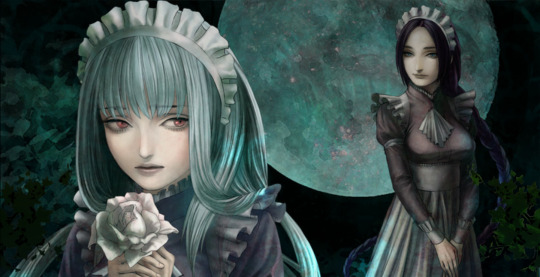

fatamoru... took me half a year to get myself to actually read it but well it's a classic and it's good as hell what can I say (spoilers under cut)
gonna link my longass livetweet thread here for posterity so it's not completely lost in the mire
this felt so targeted though it's legit dumbfounding. I went into it only recalling 1 and a halfish spoilers of 1) michel is the MC and 2) he had trans stuff going on and honestly if anything my jumping at shadows and going HUH WAIT ? the whole time knowing that kinda heightened the experience for me early on. I was about to say at first it was hard to know what parts of the story I should really sink my teeth into but I think that was the intended experience... these stories aren't yours etc...
the atmosphere and ost especially is also like soooo crazy good I was worried it'd be hard for me to stay focused on this game without voice acting but I was surprised how well it stuck even if some of the sfx are very obviously old and scuffed none of them took me out of it much (this has been a legit issue for me with some games.. the otomate sound library is really scuffed sometimes LOL) and even when the game was going over the same events, in different contexts etc it never started grating on me so that is a huge W. too many fucking games act like you just weren't paying attention when you were reading and it not only pisses me off but it's just so boring. so this avoiding that entirely was really good. GRIPPING. some of it was so edge of my seat I think I played for like 10 or more hours straight I thought I was gonna die but in a good way LMAO
I don't think I have anything interesting or poignant to say about the actual story itself other than despite everything I want jacopo dead, I totally get the point about letting go and moving on and a cycle needing to be broken and it was visceral and moving and so real to me. but also. jacopo deserved all that shit. everything else though I'm just sitting there yelling TRUE AS HELL!!!!!! really loud. I love you michel I love you giselle I'm gonna get u outta there morgana.
wait I lied. morgana as the white haired girl. it's not fucking fair.... I wanted to save her... I do think 'she' truly did become part of morgana again though, based just on how scared morgana was of didier at the end, at the cries of being called an unholy witch... a fear that only she held, morgana sort of reveled in being a witch in the course of carrying out the cruelty. but the saintly part of her feared that fall, that complete inversion of her self and the hatred it pointed towards her as well... man : ( ........... : (
I could write an essay specifically on the ways I relate to michel to a like genuinely scary degree the overlap made me sick to my stomach in the best way. but honestly I would be a weepy mess at the end of it so I don't wanna do all that. as an aside though apparently the author(s) have said he's "only intersex, not trans" but man I think that's a stupid as hell delineation to make. he's both. he was assigned 'female' at birth and was raised as a woman and chafed against the social role of 'woman'. IF ANYTHING I relate to him more about not necessarily feeling dysphoric/lacking in regard to his genitals on his own but more about the fact that that somehow invalidates his status as a 'man' being something that torments him. it's a topic that overlaps imo. but the fact the game handles it with as much tact as it does while being as old as it is surprised me. though I could see it being still too upsetting for some because the depiction of the trauma is kind of like. viscerally too real almost. when giselle described her abuse... it wasn't even descriptive in the disgusting voyeuristic way it so often is in other places, but the representation of how it just feels to be subject to that was so real that it really really fucked me up... I'M DOING THE THING I JUST SAID I SHOULDN'T AAHHH but well. it's really good. it's like eating a heavy but hearty meal where it's so good but I can feel it sitting in my stomach and the weight of it just makes me groan. does this even make sense anymore. man.
ok a selection of my fav screengrabs to play me off before I continue in such a manner.
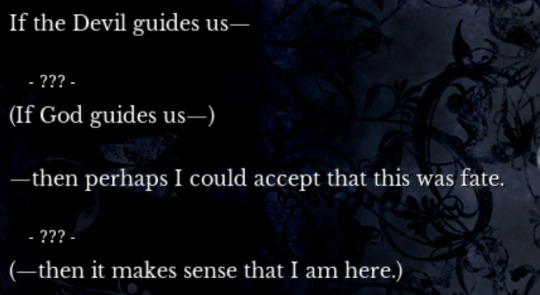

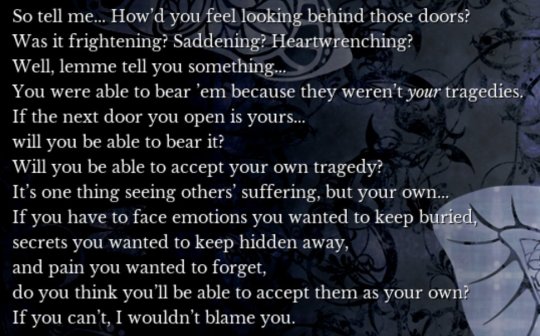
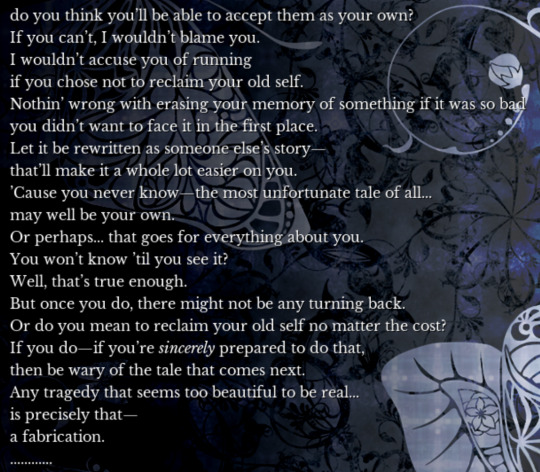



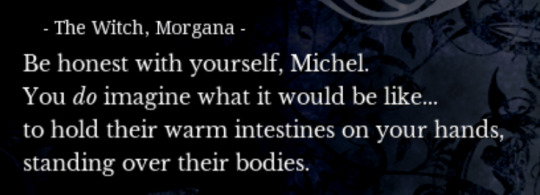
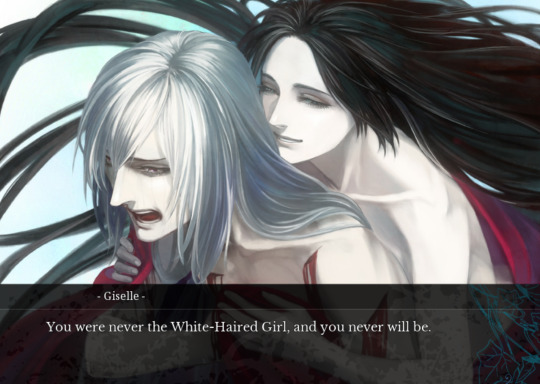
GISELLE PUFFED CHEEKS VERY CUTE
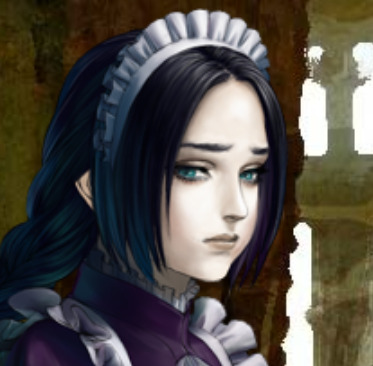
#car's 2024 media#MY ONE SINGLE NITPICK I didn't like how gaze-y a lot of the giselle CGs felt especially considering the context but that's about it#well one nitpick other other than. jacopo moments#car talking
5 notes
·
View notes
Note
Why do you like Kakasasu?
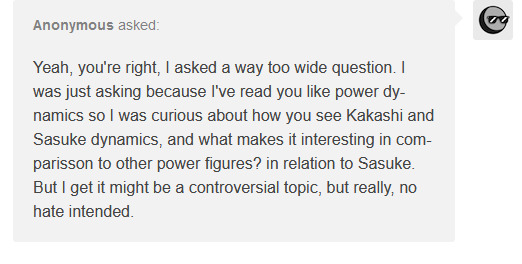

I waited to reply to this because I wanted to be sure it wasn’t a troll and it wasn’t a drama starting attempt (like this or this, gems found in the sasuke/KS tag) since it’s a subject I am very interested in.
I replied to Kakashi/Sasuke related asks, shippy or not shippy, here, here and here. More about them here, here and here. Put yourself comfortable cause this is gonna be long. Not putting it under a readmore cause I remember ppl complaining they coulnd’t open it on mobile phones (?). Also, moralists who are lurking: don’t interact, get out of my blog. Youll be blocked on sight.
When I started reading N*ruto I was into Bleach a lot, and the fact that the characters were a little older and looked older made me not get into Nar that much at first, because they looked like kiddies lol. I didn’t care about Nar as a character and his initial rivalry with Sas was cute but not enough to get me interested. Only when Kakashi got closer to Sasuke I started being veery interested in the story and in the characters. What I found intriguing was that Kakashi was older and an authority figure, but also someone to look up and who helped his students, BUT at the same time he wasn’t exactly a father-like figure or a big brother-like figure, because he had his dark side, that back then wasn’t well flashed out but that nevertheless showed a closed-off person who kept everything inside, not letting others get too close to him.
(then I started liking N*rusasu mostly because there were so many cool doujinshi especially Emi10/Rankai and Engawaken, while KS doujinshi were so meh, kinda in old yaoi style like Loveless, with tiny Sas who looked even younger hahaha, not my thing)
As those who know my blog and/or my writing know already, I am not interested in healthy, cute, positive dynamics in fiction. I might enjoy them, I might be happy when there are such moments, but I can’t like a whole relationship/dynamic/story only like this because I like to explore complicated ones in fiction.Because fiction is very useful for this, it makes you explore dark, taboo things, without affecting reality (no matter what idiots say), it’s cathartic, it’s a way to do, see, experience things without doing anything.
Back to topic tho, I found their initial dynamic very intriguing. A broken, traumatized yet extremely driven Sasuke, acting as confident and strong as he can, but showing his trauma in various occasions, otherwise being mostly aloof, lost in his own thoughts, and a differently broken Kakashi, acting chill but at the same time always ready to act when needed, yet always kinda distracted, aloof, lost in his owh thoughts (and later we’ll know he took Obito’s mannerisms because he was a stickler to rules). The way Kakashi takes a special interest for Sasuke, clearly the most driven, the best of the team, with whom he holds back much less (when he trains them, like when in the beginning, during the bell test, he fights with Sas and seeing that he almost took it, he overpowers him) while he is different with the others (Nar will have Jiraiya later). The way he protects Sasuke during the chuunin exams, while he’s in the hospital and Kabuto is trying to kill him.
Mostly, the controversial moments...like I said I live for these kind of things. where he both protects and threatens him...like when he does that seal to Sasuke, for his curse mark, and he tells him that if that curse mark takes over he’ll kill him. Or when he ties Sasuke up so he won’t join Orochimaru.
Before someone says bs like *you’re not Sas fan if you like that scene* (I know there are many like this and I want all of them out of my blog btw) uh, it’s not how it works guys. You can support a character and still be intrigued by scenes where said character is tied up/in a forcibly submitted position and so on. Guess what, some of those scenes are made for fanservice even (and Sas has many of these, so if you don’t see the appeal/refuse to admit that there is appeal, it’s you who have a problem). So even tho I disagree with Kakashi not wanting to listen to Sasuke’s reasons for revenge (and later supporting SHikamaru’s, I replied to this in one of the asks I linked) I do find that scene interesting...I mean Sasuke tied up in a very suggestive way and yet defying him and threatening to kill his loved ones and Kakashi opening up in a very weird way vaguely replying that he lost those ppl already? It shows a lot about them, their personalities, everything.
I am sticking to part 1 because there are more meaningful interactions between them, I wished there were more in part 2 but kishi shifted Kakashi’s ‘interest’ to Nar, making him one of Nar’s followers...even so, the intractions they had were very interesting. Their fight after Sasuke fights Danzo is one of my fave moments in the whole story tbh, much more than the later confrontation with Nar. Kakashi for the first time has an inner only, yet strong, emotional reaction, having to fight and supposedly kill his former student who became a rogue with a death sentence on his head...he realizes this is how Hiruzen felt against Orochimaru. It’s a strong realization from someone like him who was always so closed off and aloof that he totally lacked empathy.
On the other hand Sasuke is in a different mindset. He’s sort of high for having succeeded in eliminating the one who made Itachi suffer so much, he’s thinking about killing the elders and destroy the village, so he’s basically lost in the recent past of Danzo’s death and in the future plans he’s making, he’s not in the present moment almost...but he has to fight anyway, and it’s a cool fight, also because he’s weakened already and Kakashi is strong...and then he gets blind, totally, and it’s an amazingly intriguing moment, the kind of controversial stuff I’m interested in, because that’s when he could be totally overpowered by Kakashi, if the story didn’t have other priorities (putting Nar in the center of attention with their confrontation).
Their later moments, like during the war, are meh cause the interest shifted already completely, but their moments in jail (anime only ofc) and their Shinden interactions (only through messages) are interesting to me. Very much so, because they show power dynamics very well, with Kakashi as THE authority and Sasuke as the one submitted. In jail it’s even more evident with him looking down at the younger tied up and blindfolded...like, wow. It’s like fanfiction material (in fact I wrote one (ff.net/a03) and there was the coolest fanart inspired by it! here..there were more but this came on my dash today so).
You mentioned power dynamics...their dynamics are all power dynamics because Kakashi was never at Sasuke’s same level and he never acted like he was, and when Sasuke was stronger, during the war, they basically didn’t interact, and when the war was over and Sasuke was brainwashed and tamed into submission the power dynamic remained the same.
The difference imo between them and other power dynamics based pairings is that they are closer than what could be defined rare pairings such as Obito (they had a very interesting one tho, if only it was developed), Madara (the story was already developed in a pro Konoha-anti Uchiha way but it would have been so cool to have the 2 Uchiha interact more), or other older and stronger characters, so the dynamic could be written in a cool way in a fanfiction but in canon Kakashi created it already. So, while I can imagine something like Shisui/Sasuke, Obisasu or more, in my head, and I can come up with some AU or canon divergent/canon behind the screen (like when Sas stayed with Obito after the transplant), Kakashi and Sasuke had canon interactions that showed power dynamics already.
(Then there is Itasasu, which is a huge power dynamic based relationship, that also had amazingly strong feelings though, and those who know me know that for me Itachi will always be Sasuke’s most loved person, and that he was the same for Itachi. So ofc imo IS is a much stronger bond compared to KS but still. Also I remember in the beginning how many fics I read where Itachi was abusive to Sas and Kakashi stepped in lol. And it’s not a mystery that even though I think the IS bond is the strongest I find other pairings and character dynamics very interesting, so much that I like to explore them even more than IS, which, imo, is almost a given fact so I don’t always feel the need to explore it)
Another thing I find intriguing is that Kakashi always saw Sas at his ‘worst’...in Konoha’s terms I mean. When he wanted revenge in pt 1, after he killed Danzo and he was weak and so desperate and hysterical that they thought he got crazy, when he was jailed. It’s a big power he has, to be able to see someone like this.
Tbh it’s a pity that there were no post war moments (B*ruto shit doesn’t count) where they interact ‘normally’ cause I would have liked to see them, both as normal interactions where they get closer again, now that Sas is older, where they train and they get physical (and Kakashi has a lot of repressed anger, jealousy and possessiveness to let out on the one who betrayed his sensei and went to another...not my opinion but it could be Kakashi’s pov) because I think power dynamic would come up a lot, even from apparently cute moments.
I’ll end this super long essay hoping that you didn’t fall asleep lol, and adding that Kakasasu was the first Nar pairing I shipped, which it speaks a lot about why I get so irritated when someone mentions it negatively.
#kakasasu#unfollow me or block me if this bothers you#even tho I want to be the one blocking you guys who have something to say against this#vivalarevolution#vivalarevolution: bonds
30 notes
·
View notes
Note
We were waiting so many years for something to happen between Dean and Cas, for something to prove we are not imagining this and all those people who abandoned the show years ago now are shitting on that scene because Dean didn’t immideately said it back?! 12 years of incredibly complex relationship and they really think it could be resolved with usual hetero “I love you” - “I love you too”? If that has happened they would be the first to tell how unrealistic it was. I’m so done with antis 😤
(sorry this got so long, also sorry for my lack of links! if anyone's after something in particular i can probably help you find The Thing.)
Your anger is valid nonny 💙
A lot of the hate going around and the jokes being made at the expense of these characters and their journey is coming from people who have never watched the show or who don't ship Dean/Cas, but that doesn't bother me much. It's frustrating but haters gonna hate so best to just ignore the outsiders.
What does bother me, just as you mention, are the shippers who either stopped watching years ago OR who are up-to-date with season 15 but they view That Scene in a negative light and are bitching into the digital void, dampening the celebratory mood of shippers who view That Scene in a positive light.
I feel sorry for the shippers who feel disappointed or angered by the dialogue in That Scene, Dean's reaction, and Castiel's "death", because honestly what show have they been watching? TBH i think if they were more involved in the fandom they would've come across informative content (in its multitude of forms) that would help them see there's So Much to be positive about.
Let's work backwards:
We will see Cas again. afaik Misha has one more episode on his season allotment contract (possibly 2? which would probably mean a brief cameo in 15x19) if you want some hard facts - i don't have links but Google is your friend here. Also, the entire cast + crew have been pretty damn quiet in the wake of 15x18 (bar a few Twitter interactions and the DarkLight Convention livestream), which is a Big Damn Clue that they're holding back because Something More is yet to come; even Misha has refrained from posting about it on his social media accounts - i think there was 1 post? - which is very unlike him (plus we hear he's written an essay about Cas' coming out which he's yet to share, possibly waiting until after his Real final episode airs, ie. 15x20). Then there's Castiel's story: it's not over. We know The Empty is compromised due to Jack's cosmic implosion, we know there are ways into and out of The Empty, and with cosmic Entities meeting their end this season maybe The Shadow will too? Plus, Cas being left in The Empty isn't a peaceful ending for him (as Ruby mentioned, those trapped there relive their greatest regrets on a loop) and also: Been There Done That In That Place so it's not a good ending writing-wise. Not to mention what we've seen of grieving!Dean means he won't find peace either as long as Cas is in The Empty/dead. 15x18 was exclusively Castiel's love confession, so Dean's is surely on it's way, which means More Cas!
Dean’s reaction was very much in-character for him. Dean's a volatile smelting pot of Anger and Too Much Heart, especially this season, and while we've seen him blow up about some matters (Chuck's machinations, failing, losing people, etc.) and be honest and vulnerable about how he's feeling (with Sam, with Jack, with Cas - usually in regards to Chuck's BS, although I'm not just talking about season 15) Cas' love confession was something else altogether, something personal just for him, for them, something Brand New: Dean's best friend reveals he's in love with him, which is unprecedented for Dean on both counts. Losing people and losing battles and suffering because of trauma and his upbringing and The Ongoing Hunter Life - that's not new. But he has zero experience with receiving genuine love confessions, which also happen to come from his best friend (who he is also in love with if the past 12 seasons are anything to go by). So his shock/tongue-tied reaction is justified, it's expected really, because like you say an "I love you, too, Cas" just wouldn't feel organic for Dean or his years-long relationship with Cas (plus it's too soon, story-wise). While Misha gave us a stellar emotional outpouring for Cas (appropriate, since he was spilling his heart) Jensen did what he does best: micro-expressions, the nuance acting he's imbued into Dean's character since season 1 and one of the top reasons He Deserves All The Awards. Anyone who complains about Dean's "lack of reaction" isn't taking into account his shock and are apparently not fans of the show because again, that's Dean/Jensen, the subtle emotional shifts in his expression that have (skilfully) conveyed Dean's state of heart and mind through the years (when his contrasting emotional outbursts weren't on display). I understand wanting more from Dean in that moment, that folks feel cheated because they didn't get More, but.. we did: Tears steadily filled Dean's eyes as the scene progressed; Fear added to his Shock as Billie and The Empty showed up and as Cas was stolen away; and OFC the curled-up-and-freakin-sobbing moment at the end as everything sunk in, as he realised he couldn't even answer Sam's call (even if something else had gone wrong) because he would've broken down - which he did.
@ the folks who wanted more from Dean in That Scene: It's There. It's in the micro-expressions, meta, parallels, subtext, symbolism, callbacks - because this show has always needed more than a passing glance; it's about the layers, the story which every cast and crew member has always had a hand in enriching by giving the audience Something More to think about, More to feel. It's in the 15 years of Dean's character journey. It's in that closing scene. It's in the 2 whole episodes we're yet to see. It's there, you just gotta look for it. You're watching Supernatural, after all.
Once again, I encourage folks to read the brilliant meta that's been coming out in the wake of 15x18 (and all of season 15) as well as the insightful thought-posts of shippers who understand the layers and the journey of Dean and Cas' relationship and manage to sum-up canon happenings so beautifully in a hundred words or less.
And you're 100% right nonny 💚
We deserve this love story because we know Dean and Cas deserve this love story, because those involved in making the show have been building towards this for 12 years, that The Slowest Burn To Ever Slow deserves acknowledgement, closure, and a happy ending.
I know it can be hard to stay positive when your dash is littered with negativity, but remember you control the flow: use that block function for tags and post content. Unfollow and block the blogs you need to. If others get their rocks off criticising and hating The Things You Love, just ignore them. They're gonna live mad about Stuff but you don't have to. Pity the haters, but don't let them get you down. Also, post/like/reblog as much positive content as you can find; drown the haters in love.
You deserve happiness just like our beloved OTP.
37 notes
·
View notes
Note
hi okay i hate sending asks to people without knowing them but you seem kind so im trying: during the break, i’ve been working my way through VM, and i’m at episode 75. my question, because i’ve read some of your more recent meta, is “what’s Percy’s deal?” i know he’s loved by the fandom, but i can’t find myself relating to him, and i find his assertions that he’s the only one with a plan offputting. is there more context you can give to me about percy’s character that explains his motivations?
aww, thank you!
(and yeah, asks like this are totally fine, i totally get that anxiety, good job on sending this!)
i mean, first off, you don't have to like a character everyone else does? if you don't relate to percy you can just, not relate to percy, that's fine
(and to be fair, as much as i love him as a character, i would not want him as a friend, because he's a very flawed person that has a lot to work on, but in fiction those traits are interesting to watch rather than difficult to deal with)
but, percy's deal! the short answer is people generally like him because taliesin's funny and charismatic and he does morally grey right, which is rare and a fun thing to explore (also in his relationships with other people, the entire vex-vax-percy-keyleth square is full of neat parallels and opposites and interesting things and i have whole essays in my head on all six combos there)
i don’t know which posts you’ve read so i’ll link this one here too, just to cover a couple more of the generally unnoticed aspects of his character, and things i like about percy
he’s also far from perfect, as you’ve noted, he does tend to believe he’s the smartest person in any given room, because he’s young and clever and used to being that, which you’re allowed to find off putting, but i will say i find he does that less than a lot of characters of his general archetype? he listens to pike, he listens to keyleth, he listens to vex, he respects when they have more knowledge than him on a particular subject, he’s not above asking for help. and generally most of the arguments he has with keyleth on that subject aren’t him asserting he knows more than her, but more a matter of principles and values (they’re a really interesting pair that way, they have similar backgrounds, both children of royalty running away from the crown, but they’re such opposites. percy is a natural leader who would rather anyone rule than him, keyleth fumbles her way through all of it but sticks to it because she doesn’t want to let anyone down, percy is a pragmatist, keyleth is an idealist, they both are too focused on the big picture but in two completely different ways, i could write a whole other post on this, but to get to my point, they wouldn’t be such good balances for each other if percy didn’t absolutely respect where keyleth is coming from)
for the long answer, i’m gonna break this down into parts and try to get to the core of percy's character and why he is the way he is
(under the cut bc this gets long)
1 - heavy trauma
like... this is the really really big one. percy, at age 17 or 18, had his entire life up to that point completely destroyed. his family was killed, his friends were killed, people he trusted like family (professor anders, who was a more present figure in percy's life than his actual parents) betrayed him and helped the briarwoods, he was imprisoned in his own castle's dungeons and tortured for information, they threw his siblings' bodies in there with him to make a point, cassandra helped him escape but as far as he knew she died helping him. he has two years of his life after that he straight up doesn't remember, his hair turned white from the stress of it.
trying to go after ripley the first time didn't work, he was captured and left to starve in a prison cell, for the first few months of travelling with vox machina he genuinely believed it wasn't real, because realistically no one was gonna come save him, this was just a hallucination of his dying mind. returning to whitestone he was forced to confront the fact that literally everyone he ever knew growing up (with the sole exception of archibald) was either dead or working with the briarwoods, and even after retaking the city there's a lot that can never be repaired.
and he's just... never really dealt with any of this? like, he gave vox machina the technical details of what happened to him in the briarwood arc, because they needed to know that information, but the first time he actually started processing his trauma, the first time he admits it out loud to anyone, is the final episode of campaign one. before then it had been occasional snide or handwavey comments, and like, he'll let himself feel the anger over it (in the beginning of the story he encouraged it, because then he didn't have to feel anything else), but he's never processed the grief, never admitted to himself how badly that affected him
which means he's got a lot of pent up emotions in there that he just keeps burying, and sometimes they come out in unhealthy ways. having so much taken from him also makes him really motivated to keep the things he does have - he’s got some deep set abandonment issues and takes any kind of betrayal really badly, don’t know if you’ve got up to the scanlan stuff by the time i post this, but that’s something to keep in mind as to why he acts the way he does there. (and it’s not more explicit because percy was raised nobility, keeping a brave face through anything is part of who he is, he tends to cover emotions he’s insecure about in snark or indifference or, for the intense ones, anger, because those are the things he thinks he’s allowed to show, but the real emotions show up occasionally, when they’re particularly strong, or if you’re reading between the lines. he really does care a lot about vox machina)
2 - legacy and loyalty.
speaking of nobility, it's hard to do a character study on percy without mentioning whitestone and the house of de rolo. this is the number one thing to percy. he was raised to respect title and name, and most importantly, raised to respect the people he represents - both the townsfolk of whitestone and also percy's ancestors and future de rolo generations. whitestone is more important than any one life, he has a duty to protect and serve it, and that comes before any personal wants he may have. it's also important to him for family reasons - he was a pretty lonely child, but he loved reading about the history of the city, all the weird ghost stories whitestone had even before the briarwoods. it probably made him feel more connected to all of that, this is the place he belongs. and after his family dies, it becomes even more important, because this is his connection to them. the soul of a city lives as long as its people, by protecting what's left, he keeps a little bit of what came before
(and also in just tidbits to understand percy's character, he sees all cities and man-made things the same way - in a world where some races live for centuries or millennia, their history exists mostly by word of mouth, you can physically talk to people who were around 500 years ago and get their take on things - humans don't have that, they get 100 years at most, so the things they build are vital to their heritage. this is how you keep people alive long after they're gone, by honouring what they created. and especially for someone so concerned with legacy and history, percy literally says abandoning westruun would be blasphemy, because the place people grew up is important, yes it's better that they live, but letting the city be abandoned and destroyed would be an irreparable act of violence.)
this is the number one thing on percy's mind when evaluating anything about himself, where do i come from, and what do i leave behind? which is a question that has a lot of moments to be tested, because of my next point...
3 - pragmatism and terrible thoughts
when it comes down to it, percy is a very ends justify the means kind of person. he finds it very easy to square away any kind of collateral damage as long as it gets him to his end goal. see: trial of the take, where he's fine to catch his friends in the blast radius of a new bomb design because he's so excited that it worked, preparing to fight vorugal and resigning himself to potentially having to kill innocent people to kill the dragon (he wasn’t okay with that, but he would do it), also his conscious decision to let ripley go, knowing she would lead to the deaths of thousands because it was her or the briarwoods and he wanted revenge
(this is by his own admission his lowest point and worst mistake, because as mentioned, he thinks about the consequences of his actions near constantly, he knew she would reproduce his guns and they would lead to a whole new form of warfare. but in that moment he was just blinded by grief and way too emotionally burnt out and did not have the capacity to care. and he spends the rest of the campaign and honestly probably the rest of his life trying to make up for that one)
he's also, by his own admission, someone who has a lot of bad thoughts he doesn't act on, he's very clever and creative and ideas for ways to use those skills for violence or vengeance come easily to him (like, percy as an actual villain would be ripley but worse, ripley's intelligent but a very direct point a to point b kind of thinker, percy has multiple times criticised her lack of imagination, a percy with her lack of morals would be terrifying)
(honestly this is why i was seeing percy so much in taliesin's narrative telephone, because "sometimes i wake up having dreamed of a terrible thing, and normally i just file that away for things that i would never do, because i wanna maintain friendships, but then LIAM did something to me." and the whole being absolutely fine with throwing the rest of the cast under the bus just to enact revenge on liam was quintessential percy)
but we’ve seen the pragmatic anti hero everywhere, anyone can be a terrible person, and have reasons for it, that alone doesn’t make an interesting character (at least not for me)
what does, is my last point
4 - trying to be good
i still vividly remember when i first watched campaign one, being really surprised at how much percy asked for help? like, i went in expecting the usual full on demon possession storyline, i expected percy to hide how bad it was, i expected him to make poor decisions without realising he was doing it until he was in too deep to back out
and like, he had some of that. but at the first sign of things being out of his control, he asked his friends for help. he let pike greater restoration him. he told vax to kill him if things ever got too out of hand. he was really, genuinely scared about what he got himself into and what he might do because of it. there was never a point where he pretended, even to himself, that making a deal with orthax was okay. the minute he realised there was a demon involved, he was working to stop it. and yeah, by the time he realised it was already a bit too late, there were already some things out of his control (and also taliesin kept having the worst rolls against the whitestone corruption which was really fun on a meta level), which is how things got as bad as they did. but honestly, all things considered, there’s very little to criticise about the way percy handled himself in the briarwood arc.
and he keeps doing that, trying to get better. he struggles with it, he struggles a lot, against his anger issues, against all the trauma, against the fact that he really doesn’t want to be here and things would be so much easier if he were dead. but he recognises he holds grudges too easily, so he starts actively trying to forgive those who’ve wronged him (this is something he and vex have in common, and something they were working on together before they were together, which probably helped a lot in getting them to that point as well). he recognises he makes poor decisions when he’s angry, so he starts learning to step back in those moments and leave the decisions to someone else. he has never not owned up to his mistakes, he takes responsibility for everything he’s done, and if he notices a problem he can’t solve himself, he asks for help.
and i find that fun to explore. like, percy’s been likened to hamlet in the actual show, and i was the kid who got super obsessed with hamlet when i was like 15 because i was in that same mental space of suicidal self hatred and existential melancholy but also thinking i was the smartest person in any given room and being too young to have gotten over the arrogance that makes you ignore everyone else’s needs for the sake of indulging your own problems. and then i got older and realised there are smarter ways to go about things, like having empathy and appreciating the light in the world and not being a dickhead to people because it makes you feel better, and maybe hamlet can be justified and in the wrong at the same time. and while there’s some stuff i won’t spoil for you, percy after ripley kills him is definitely starting to learn that, which you rarely see in the hamlet archetype, bc everyone’s like “ah yes so Deep so Important who cares what bad things this person did they had Trauma and are Clever”
well, percy cares about the bad things he did, and cares about not doing those anymore. so like, he’s still a disaster of a person bc he’s like 23 and no one has their life together at 23, especially not someone in percy’s situation, and honestly i find that fun to watch as well bc i like watching characters make stupid mistakes and do stuff i’d never approve of in real life, and as i mentioned at the start, taliesin makes captivating and funny characters. but yeah, that’s generally where percy’s at, most of the time
#would you believe me if i said this was the second shorter attempt at answering this ask?#i honestly tried to pare it down but this hit at least 6 or 7 separate essays in my head that all wanted to be included#and then i had to figure out how to combine them#my brain keeps giving me more things i should add but i think this is enough to be going on with for now 😂#but hey anyone who likes listening to me talk about percy know i can keep going#this is my word MINIMUM#(and it's still over 2k im so sorry)#but yeah hope this helped!#cr1#percy de rolo#cr thoughts#text#meta#ask#megabees3
86 notes
·
View notes
Photo
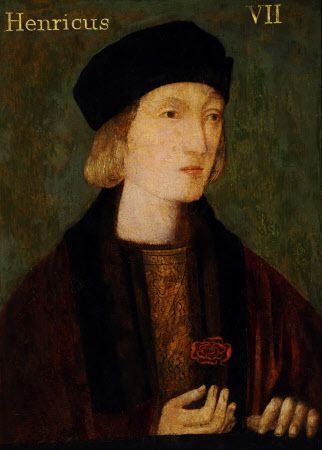

~HENRY TUDOR: A SOCIOLOGICAL INTERPRETATION.~
Today, I'll be discussing a character who left his mark in History, fathering a dynasty whose most proeminent members were his (second) son Henry VIII and his granddaughter Elizabeth I. Often overshadowed by his descendants, Henry's own deeds as a king and as an individual of his own days have been neglected until recently, when efforts from British historians have been working hard to change that.
The reason why I decided to bring him here was not only due to personal affections, though they certainly helped it, but because there are aspects overlapped in social structures that shaped him. In other words: what's Henry Tudor as a sociological individual? Can we point him out as a constant foreigner or someone whose socialization process were strongly marked by the addition of two different societies?
Henry Tudor was born in Pembroke, located in Wales, in January 28th 1457. His mother was Margaret Beaufort, a proeminent lady whose grandfather John Beaufort was the son of John of Gaunt, son in turn of King Edward III of England. The duke of Lancaster fathered four ilegitimated children (who were legitimated in posterity) by his (third marriage to his then) lover Katheryn Swynford, amongst whom John Beaufort was the oldest. Therefore, Henry was 3x grandson. to the duke and, despite what some might argue when Henry IV became king, in great deal to inherite the throne. Well, it's not my intention to deepen the discussion as to Henry's legitimacy or the Beauforts.
Though his father's ancestry, Henry's blood led him to the royal house of Valois. His paternal grandmother, Katherine de Valois, was the sister of Isabella, who had been the second wife of the ill-fated king Richard II. She was also descended of Louis IX and his spanish wife, Blanche de Castille. Henry was also a royal man from the Welsh lands, as Owain Tudor, his grandfather, was related to several princes of Wales. By all these I said, the first thing one might think (considering 15th century and it’s nobility) Henry would receive a proper education due to his status. However, this would not happen in the strict sense of the word. Let us not forget that England was collapsing by the time of Henry Tudor's birth and his childhood. Why am I using the word 'collapse' to qualify the civil war we know named as wars of the roses?
Émile Durkheim, a french sociologist, would write several centuries later, about how a society is formed: he compared it to the working of a human body. If the head, the brain of our body does not work well, what happens? The body will not work well, certainly. Neither would the head work well if other parts hurt somehow. Although if you did break a leg, you could still make use of your brain, but as a whole how limited wouldn't you be? He'd also say that when the human body, or as he called, the society was sick, it was because of the social structures which imposed the human being to the point where there would be no individuality, no matter of choice.
Such created social facts that were completely external (althoug well internalized through means of a process we call socialization) but coercitive. If they are not working, what does this mean? That soon another social facts will be replacing the former one. But between one and another, we have a "very sickly" society. Taking this understanding back to England's 15th century, it is not difficult to see what Durkheim was talking about.
The king was the head of the English body. If we have here two kings fighting over one crown, fighting over the rule of an entire body... Well, then? We have the collapse, a civil war that lasted for the next 30 years. Here, it's less about discussing who started what but why they did what they did, and the explanation for it. Power is power. It's crystal clear, and a statement that, however simple might it sound, points to the obvious. Factions that fought for power intended to dominate others, using the concept very well developed by sociologists as Pierre Bourdieu and Norbert Elias. This domination is a large field, a concept that embrace all sorts of it. Looking back to England's latter half of the century, domination was peril. The head was about to explode. The society was ill... and dominated by it.
What were the values? What was the racionalization proccess of social action led by individuals that were not only individuals but a group? How would all of this affect Henry Tudor? It was not about merely blaming the capitalism, because such coercitive system wasn't present yet. But Henry was, directly or not, linked to the royal house of Plantagenets, whose eagerness for dominating one another and by extension the rest of the country would include him in the game.
"Game." For Durkheim, this would imply an agitation, like a wave of sea, from which no one could escape from. Let's not forget that Institutions created ideas, renewed them, shaped them to the practice whether to dominate the weaker or to defeat the stronger. Whatever the purpose, we here have the Church, not the religiosity, but the precursor of ideas would subdue individuals to share (or manipulate to their own goals anyways) values in order to keep determined mentality to it. But also, monarchy was too an institution which held control over the lives and deaths of thousands of people. A monarch, as we know, is never alone regardless of how "absolut" they could be in different times and contexts. They were not above the law, either. At least where the socialization process is concerned. For the monarch embodied the content which was the law back then. He was literally the law.
Furthermore, Henry's education would foresee this fighting, which I'm not merely referring to custody going from his mother to another, before finally staying under his uncle's responsibilities, as well as the civil war itself. (Anyone remembers Warwick executing Herbert before the boy?)
See, we all know and comprehend today what trauma are capable of doing to someone. Such experience is the main responsible for shaping ideas, values and even costumes. Now, a society which is very much sick by it's own values and moral costumes (a point here must be made: the public consciousness always preached for a warrior, strong king, but has no one thought how this "common sense", validated by a general expectation towards the head of society, was what led it to... well, for the lack of better word, suicide itself?
For it's widely accepted that weak kings do not last long. But that is when we deal with a good deal of expectations that, when turned to frustrations, bring awful results. If England's society was ill in it's very extreme sense of the word, was because the values they created turned against themselves and that would leave it's mark in a boy as Henry. And until the age of 14, he was still absorbing these concepts, these morals, values, costumes from institutions (let's not forget that a monarch shares such with the nobility that surrounds him, as was the case of House Lancaster,f.e) before he was casted out to Bretagne and, in posteriority, to France. Now, I believe you all know what was done whether in England or with our king during these 14 years spent outside his own country before he became king upon the victory settled on the battle of Bosworth field.
I am not interested in discussing historical facts. At least not now, as we are finally dealing with Henry Tudor as a social actor
----/-HENRY TUDOR: A FOREIGNER? AN EXILED? OR AN OUTCAST?--
These questions mobilized me as I came to read a text written by 19th century sociologist named Georg Simmel. He wrote an essay (pardon by any mistakes in translations done from here on) entitled "The Foreigner", in which he brings a sociological question at why foreigners are seen as strangers who are never entirely immersed in the society they attempt to be part in.
Here's an excerpt translated by me in which he explains it:
"Fixed within a determined social space, where it's constancy cross-border could be considered similar to the space, their position [the foreigner's] in it is largely determined by the fact of not belonging entirely to it, and their qualities cannot originate from it or come from it, nor even going in it." (SIMMEL, 2005: 1.)
Furthermore, he adds:
“The foreigner, however, is also an element of the group, no more different than the others and, at the same time, distincted from what we consider as the 'internal enemy'. They are an element in whose position imanent and of member comprehend, at the same time, one outsider and the other insider." (SIMMEL, 2005: 1).
Here's why Henry, as Earl of Richmond, was not well seen by the Britons and the French, in spite of being "accepted" by them. Never forget that he would still be seen as an outsider by his own fellows. As Richard III would call Henry a bastard, one could understand this accusation with sociological implications. English back then detested these foreigners and by the concept brought here by me from Simmel we can understand why. But we could also see being called a bastard as a way to point out Henry's localization. Where can the Earl of Richmond & soon-to-be king be located?
I have pointed this far the structures which were raised and caused a collapsed society to live broken in many, many ways and how this affected Henry this far. Seeing how foreigner he was, nonetheless, he did not belong neither to England (at first) nor to the Continent.
On that sense of word, says Simmel (2005: 3):
"A foreigner is seen and felt, then, from one side, as someone absolutely mobiled, a wanderer. As a subject who comes up every now and then through specific contacts and yet, singularly, does not find vinculated organically to anything or anyone, nominally, in regards to the established family, locals and profissionals”
Even though we find a dominant group of foreigners in France, as we are talking about of nobles displeased with the Yorkist cause and supporters of the Lancastrian House, they were not majority. Where can we locate Henry, then? We don't, because he was not a French and however well he could speak the language, it was not his birth language. The French culture was not passed nor naturalized by him through the teachings of a family or the church by the institutions: monarchy, church, family, parliament, etc; he would have been defeated a long time. But that he did manage to, using this popular expression, put things together and become the first king to die peacefully since Henry V, it tells us a lot. Not rarely an immigrant is accepted by a society whose demands are forced upon him, most of the times in aggressive ways. But it's not often either that we see a king occupying such place in society.
Indeed, one might say that kings as Henry II and the conquerors before him were too foreigners, but not in the sociological way I'm explaining. Because the social structures were different. Henry's government were settled in a more centralized ruling, far more just and peaceful, more economic and less concerned with waging wars than his antecessors. The need to migrate was not 'forced', neither 'imposed' and even back to the 11th and 12th centuries were motivated by different reasons. That's to accentuate how English society evolved throughout the centuries. And I used again and again Georg Simmel to prove my point about casting a sociological light towards Henry VII not as a historical character so distant of us and who remains an object of controversial discussions, but a man of his times who was forced to deal with expectations that placed him in social positions nearly opposed to one another to fulfill each role whether as king or as a man. For some reason, the broken society shaped Henry as an immigrant, but as history shows us, it was this immigrant who helped shape medieval society, directing it towards the age of Renaissance and in posteriority to Modern Age.
Finally, to close this thread I leave here another quote (translated to English by me) found in the text written by Simmel:
"The foreigner, strange to the group [he is in], is considered and seen as a non-belonging being, even if this individual is an organic member of the group whose uniform life comprehends every particular conditioning of this social [mean]. (...) [the foreigner] earns in certain groups of masses a proximity and distance that distinguishes quantities in each relationship, even in smaller portions. Where each marked relationship nduced to a mutual tension in specific relationships, strenghtening more formal relations out of respect to what's considered 'foreigner' of which are resulted." (SIMMEL, p 7).
Bibliography:
AMIN, Nathen. https://henrytudorsociety.com/
DURKHEIM, Émile. "The Division of Labor in Society”.
KANTOROWICZ, Ernst H.”The King’s Two Bodies: A Study in Medieavel Political Theology.”
PENN, Thomas. Winter King: Henry VII and the Dawn of Tudor England.
SIMMEL, Georg. The Foreigner. In: Soziologie. Untersuchungen über die Formen der Vergesellschaftung. Berlin. 1908.
#Henry VII#King Henry VII#Henry VII of England#sociology#socio-history#historical sociology#immigration#sociology of immigration#Henry Tudor#Tudor dynasty
29 notes
·
View notes
Text
Analysis: Warrior's of Hope (Peds Psych 101)
SPOILER WARNING FOR DANGANRONPA ULTRA DESPAIR GIRLS
This post will look at the Warriors of Hope as a group. Now since we are talking about the Warriors of Hope, we will be discussing child abuse. So if at any time you feel things are getting to you or need to decompress after the essay, feel free to click this link.
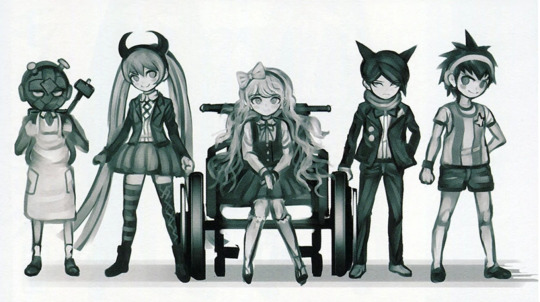
What is a Paragon?
To start, we will be focusing on the paragon trope, defined by Overly Sarcastic Productions as a hero that is both righteous and charismatic; your "do no wrong" hero, if you will. They do what is right all the time because of their personal beliefs. Protected by a heavy coat of plot armor, they gather a small group of companions who learn through their example to be better heroes; and together they overcome evil and spread peace throughout the land. That’s the basic formula of a paragon hero, if you want or need a more in-depth explanation, I would strongly suggest watching OSP’s video.
In the first game, we follow Naegi, your textbook paragon hero up against Junko Enoshima, the queen of charisma. I feel it important to mention that Junko, while almost a paragon in the way she gathers her followers, is missing the key ingredient of knowing she’s doing is right, because she admits to the opposite. She’s doing the wrong thing on purpose to see what will happen and how far she can take it.
While in the second game you look at Hinata (our paragon hero) up against Komaeda; someone who believes wholeheartedly they are right, but lacks the charisma to rally allies in-universe. You can love Komaeda all you want, but no one during the game's central plotline seems to particularly like him or want to follow him. Which makes Junko and Komaeda foils of each other in a way, each consisting one half of the paragon trope.
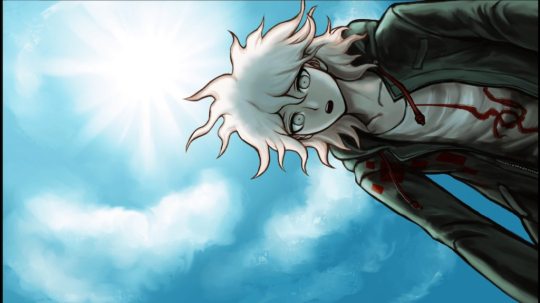
So what does this have to do with Another Episode? Simple, the dynamic is flipped. The Warriors of Hope are each paragon’s in their own right, varying on the scale of righteous and charismatic. But what makes them villains is that what they believe to be right, is in fact horrendously wrong. Their righteousness and charisma become their greatest flaw when pointed at the wrong enemy. It showcases how this type of character can be equally dangerous on the “wrong side”. We see this especially in Nagisa, who has openly convinced himself the ends justify the means. A place where children can be safe is the top priority, nothing can stand in the way of this ideal, not even the lives of other humans.
Additionally the real heroes of this tale are two halves of the paragon hero, like Junko and Komaeda. We have Fukawa; hideously unliked by everyone around her but righteous to a fault, and Komaru; an ordinary girl who appeals to everyone, yet has no strong beliefs outside of her need to feel safe. We are reminded throughout the game over and over again that the reason Komaru was picked as the heroine was not because she wanted to help others, but because as an ordinary girl. And this isn't portrayed as a bad thing. When teamed together, Fukawa and Komaru formed a paragon duo strong enough to overcome the obstacles before them. The game flat out states they are meant to work together, in order to make up for each others shortcomings.
So it is here we see the typical dichotomy of Danganronpa flipped in Another Episode. In which two character types that were typically used for villains are up against a group of paragons set on a path of destruction. Bringing to question, if someone like Naegi were to be sent on the wrong path, could they be redeemed and change direction?
And the answer the game gave us… was no.
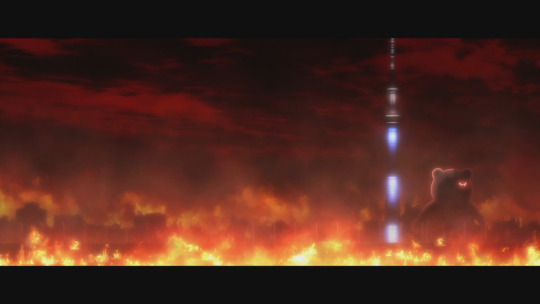
At both the end of the game, and the end of the anime we are left at a standstill where neither side will move. No outside force can change how a paragon thinks other than the paragon themself. Sure outside circumstances may kick-start introspection, but they can not change the way this type of character progresses by force. Not to say that change is impossible; but that journey would take more time then both the anime and game could allow, especially if we were to cover all five characters. But further discussion on the matter should be left on a character, by character basis.
Age and Developmental Stages (Time to Get Scientific)
As a BSN with a particular interest in pediatrics and psychology, a great deal of my analysis’ will refer back to my classes. Writing characters under the age of eighteen can be really difficult for writers, especially if they are not in constant contact with at least one individual from the age group they are trying to portray. Often times in media, we find child characters to be annoying, grating, and unrealistic; because on an instinctual level, we understand that's not how children that age typically act. You won't see an eight year old acting like a teenager, or six year olds throwing tantrums.
This is especially important, because children are not bound to the same rules as adults when it comes to understanding the world around them
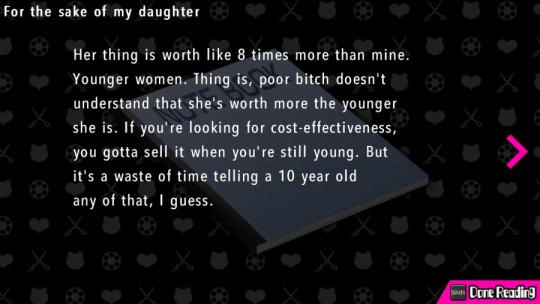
According to Kotoko's mother, Kotoko was still 10 years old while she was alive. And while we can't determine when exactly her murder took place, we can say it happened shortly after the despair incident but before Junko was locked in the school. Since the children still refer to themselves as Super Elementary School Levels, they can be no older than 13 based on the Japanese school system making them range anywhere from 10-13. So what does this tell us about how they should think?
Erikson’s theory of child development indicates they are just now gaining their own sense of identity outside of the roles they had been assigned. There is pressure to look to the future and what they want to be when they grow up. If they don't see a place for themselves in society or dislike the role they've been forced into, they will be more likely to rebel and cave to peer pressure. We see this especially with Nagisa who struggles between his role as the new leader verses his previous role as the dutiful son. If they are on the younger side, their sense of self worth relies heavily on the praise of their peers and mentors, seeking approval of their accomplishments. They define themselves through peers and test values/belief systems against society.
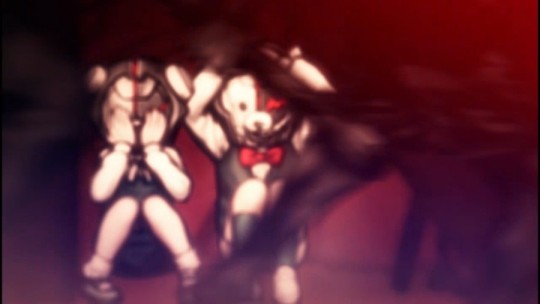
Above all else is an inherent inability to understand abstract concepts, or ideas that extend beyond where they are and what they know. Simply put, they cannot understand why adults are bad or that someone may have an ulterior motive. They know that their parents were bad, so all adults must be bad. This idea is reaffirmed when their peers share the same conclusion.
Everything is black and white, good or bad, right or wrong. They are just beginning to understand that an idea, such as freedom, means something different to everyone. Until they fully comprehend this, they are unable to fully empathize with individuals that don't share their viewpoint. When it comes to things that are not physical like love, empathy, morality, justice; they simply can’t understand it the way adults do.
In their mind, their view is right because they are good, anyone who disagrees must be wrong and therefore bad. This is not a moral thing, it’s how they cognitively process the world.
This is in no way saying their actions were justified. Simply, that they were just beginning to understand that there are things outside of what we see/say/do. The idea that someone can be both good and bad, nice yet dishonest; was not something they knew before Monaka betrayed them.
Coping Mechanisms in Children
When it comes to abusive situations, a huge emphasis is placed on power and control. Children in these situations will do anything to seek the control they do not have. This can include laying low, people pleasing, hurting themselves or others, aiming for over-achievement or perfectionism. It's not entirely uncommon to see children using multiple coping mechanisms at once, jumping from one to another until they regain a sense of safety and stability.
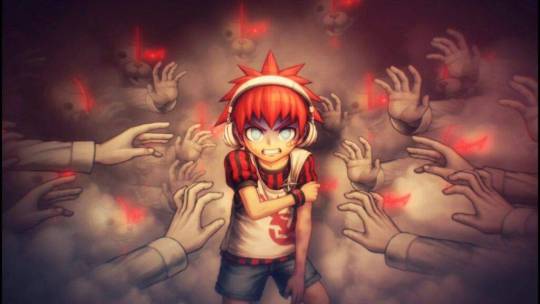
In times of stress, children will exercise their ability to control their perception of what happened. This can include denying the effects of trauma (Masaru), detaching their emotions from what happened (Kotoko) and failure to see that something can be positive and negative at the same time.
Children may also try to change or justify their situation. They can try to rationalize, or explain why something bad happened to them, even if the explanation is not grounded in reality (Jataro). Or they may try to please/appease those who hurt them by seeking approval (Nagisa).
I cannot emphasize enough the importance power and control has over children in these situations. Power is safety, exercising that power is a reminder of that safety.
Building the Children's Paradise has less to do with recreating Lord of the Flies, and more to do with creating a place where they have control over everything in their environment (rules, peers, and who is allowed close to them). Anything that threatens their position of power is an immediate and personal threat to their own sense of safety. For example, the peers they consider friends are brainwashed into doing exactly what they say. The only adult allowed near them acts as a slave to be manipulated and mistreated.
The Influence of Role Models and the Importance of Subjective Information
We know very little about their parents from a omnipotent view. With the exception of one letter from each parent, all information comes from their victims. However, there is still much we can determine about them, in how the children themselves behave.
According to the "Identification" theory; a child's behavior patterns, beliefs, and values are greatly influenced by their parents. And not because it was something that was taught, but it was something they saw routinely growing up and adopted themselves. While this does not eliminate their ability to make their own choices, a great deal is to be said about learning through example. Self destructive behaviors like substance abuse, low self-esteem, and violent behaviors are often traits learned by watching their parents. We know in great detail about what the parents did to their children, but very little about what their parents did to themselves or peers.
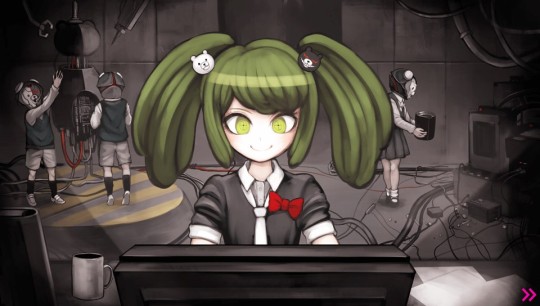
Likewise, the kids have an opposite view of Junko which is equally as biased and inaccurate. According to the Warriors of Hope Junko is sweet, caring, and blameless. As someone who met one of their most neglected needs, she represented a sense of security and love they never had. But we all know Junko's true nature and how manipulative she can truly be. The children actively deny any accusation against her because she became, essentially, their surrogate parent. It's not clear how involved she was with them, but we are given a sense that at face value, she took care of them the way a big sister ought to. Once again, an example of this black and white thinking still held by the children, it also gives us insight on the validity of their information.
Questions like "Why does Junko want to destroy the world?", "Why is my dad an alcoholic" or "Where’s the rest of my family?" may not have occurred to the kids as important, and certainly were not included in the original narrative. With no intent to excuse the abusive behaviors, it's important to keep in mind we are given a very narrow and subjective view of their home lives that purposefully excludes any positive redeeming aspects. This is all by Junko's design; as a way to keep them in a traumatized, despair-induced state that would facilitate the killing of adults.
We know this, because several rules of the Children's Paradise Commandments expressly forbid remembering the past and emulating the behaviors exhibited by their parents (including Nagisa trying act as a competent leader). Any positive influences their parents (or any other adults) had are actively being repressed to perpetuate the massacre of Towa City.
Cultural Considerations
If you're reading this, there is a high probability that you live someplace other than Japan. Your views on everything are influenced by the culture you grew up in, and just because we can relate to other cultures, doesn't mean that we completely understand them and the issues their country faces on a daily basis. The best we can do is look at the window they provide us.
In Japan mental illness is a taboo topic to discuss publicly. It's seen as something to be ashamed of or suffer in dignified silence to protect the family's reputation. Equally taboo is the discussion of child abuse, with the Japanese government only starting to track of cases in 1990. 50% of all sexual abuse cases go unreported because of Japan's cultural stance on upholding strong moral values closes off the discussion, in a “it could never happen here” sort of way.
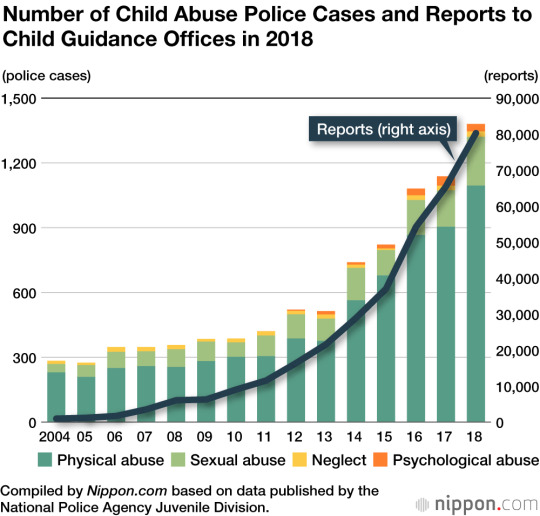
Foster homes in Tokyo are packed to capacity with kids that were taken from their abusive environments with nowhere to go. Not because people don't care, but because culturally, the discussion of abuse and having an adopted child are not embraced the same way as in other cultures.
In fact, both Kotoko and Nagisa point out that the surrounding adults wouldn't help them. It's not entirely unthinkable, given Japan's history, that they had tried to reach out for help; only to be let down by a system that was still adapting to discussing the topic. The revolution of reporting and advocating for children's rights is still a new and growing practice in Japan.
When Danganronpa Another Episode released in Japan, the number of child abuse cases were the highest ever, surpassing 70,000 reported cases for the first time and has been rising since they first started reporting cases. This isn't to say people were abusing their children more over the last few decades, but that people's stance on reporting abuse has drastically changed and continues to improve. Games like Another Episode not only champion the cause of child advocacys among newer generations, but spreads it to a wider audience, including people who will form and change the governmental and social aspects of Japan's culture in the future. Games like Another Episode provide an important platform to discuss societal issues that have for years been ignored because talking about them was 'uncomfortable.' To unironically quote G.I. Joe. "Knowing is half the battle."
Abuse in DR
The topic of child abuse is not a new one to the DR universe. In fact several characters share similar childhoods and have spoken quite openly about them.
(Masaru: Oowada, Kazuichi)
(Jataro/Monaka: Fukawa, Mikan)
(Kotoko: Sayaka, Hiyoko, Akane)
(Nagisa: Togami, Ishimaru)
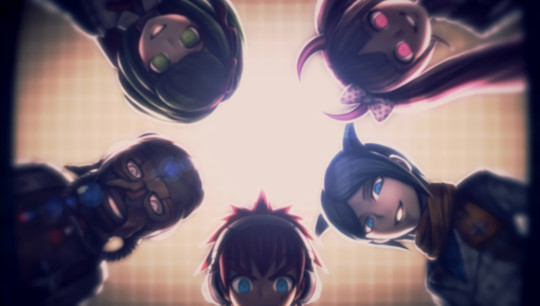
What separates the Warriors of Hope from the other characters, is their age and proximity to these negative events growing up. We closer see the impact of what these things to do to their personality and worldview because they're still children. It's all the more heartbreaking because we understand, while dramatized, it is something very real and in some cases, relatable. Seeing their stories play out, makes us uncomfortable, because we know that there are children out there that experience similar pain and there is very little we can do about it at the very moment we are reminded these things exist.
However, it is important to acknowledge the things about society that upset us, as it is a crucial step in orchestrating change.
I'd like to end by highlighting charities and organizations working to fight child abuse in my own country. If you do not live in the United States I would highly recommend finding reputable charities in your area that are working to help, if you are interested in volunteering or donating to the cause.
Thank you so much for reading this crash course through child psychology and I look forward to seeing you in the next analysis.
http://www.ylc.org/
https://promisehouse.org/
https://lnfy.org/
#danganronpa#ultra despair girls#danganronpa another episode#danganronpa ultra despair girls#drae#long post#character analysis
10 notes
·
View notes
Photo

The Myth of the Kindly General Lee
The legend of the Confederate leader’s heroism and decency is based in the fiction of a person who never existed.
Story by Adam Serwer
The strangest part about the continued personality cult of Robert E. Lee is how few of the qualities his admirers profess to see in him he actually possessed.
Memorial Day has the tendency to conjure up old arguments about the Civil War. That’s understandable; it was created to mourn the dead of a war in which the Union was nearly destroyed, when half the country rose up in rebellion in defense of slavery. This year, the removal of Lee’s statue in New Orleans has inspired a new round of commentary about Lee, not to mention protests on his behalf by white supremacists.
The myth of Lee goes something like this: He was a brilliant strategist and devoted Christian man who abhorred slavery and labored tirelessly after the war to bring the country back together.
There is little truth in this. Lee was a devout Christian, and historians regard him as an accomplished tactician. But despite his ability to win individual battles, his decision to fight a conventional war against the more densely populated and industrialized North is considered by many historians to have been a fatal strategic error.
But even if one conceded Lee’s military prowess, he would still be responsible for the deaths of hundreds of thousands of Americans in defense of the South’s authority to own millions of human beings as property because they are black. Lee’s elevation is a key part of a 150-year-old propaganda campaign designed to erase slavery as the cause of the war and whitewash the Confederate cause as a noble one. That ideology is known as the Lost Cause, and as the historian David Blight writes, it provided a “foundation on which Southerners built the Jim Crow system.”
There are unwitting victims of this campaign—those who lack the knowledge to separate history from sentiment. Then there are those whose reverence for Lee relies on replacing the actual Lee with a mythical figure who never truly existed.
In the Richmond Times Dispatch, R. David Cox wrote that “for white supremacist protesters to invoke his name violates Lee’s most fundamental convictions.” In the conservative publication Townhall, Jack Kerwick concluded that Lee was “among the finest human beings that has ever walked the Earth.” John Daniel Davidson, in an essay for The Federalist, opposed the removal of the Lee statute in part on the grounds that Lee “arguably did more than anyone to unite the country after the war and bind up its wounds.” Praise for Lee of this sort has flowed forth from past historians and presidents alike.
This is too divorced from Lee’s actual life to even be classed as fan fiction; it is simply historical illiteracy.
White supremacy does not “violate” Lee’s “most fundamental convictions.” White supremacy was one of Lee’s most fundamental convictions.
Lee was a slave owner—his own views on slavery were explicated in an 1856 letter that is often misquoted to give the impression that Lee was some kind of abolitionist. In the letter, he describes slavery as “a moral & political evil,” but goes on to explain that:
I think it however a greater evil to the white man than to the black race, & while my feelings are strongly enlisted in behalf of the latter, my sympathies are more strong for the former. The blacks are immeasurably better off here than in Africa, morally, socially & physically. The painful discipline they are undergoing, is necessary for their instruction as a race, & I hope will prepare & lead them to better things. How long their subjugation may be necessary is known & ordered by a wise Merciful Providence. Their emancipation will sooner result from the mild & melting influence of Christianity, than the storms & tempests of fiery Controversy.
The argument here is that slavery is bad for white people, good for black people, and most important, better than abolitionism; emancipation must wait for divine intervention. That black people might not want to be slaves does not enter into the equation; their opinion on the subject of their own bondage is not even an afterthought to Lee.
Lee’s cruelty as a slave master was not confined to physical punishment. In Reading the Man, the historian Elizabeth Brown Pryor’s portrait of Lee through his writings, Pryor writes that “Lee ruptured the Washington and Custis tradition of respecting slave families” by hiring them off to other plantations, and that “by 1860 he had broken up every family but one on the estate, some of whom had been together since Mount Vernon days.” The separation of slave families was one of the most unfathomably devastating aspects of slavery, and Pryor wrote that Lee’s slaves regarded him as “the worst man I ever see.”
The trauma of rupturing families lasted lifetimes for the enslaved—it was, as my colleague Ta-Nehisi Coates described it, “a kind of murder.” After the war, thousands of the emancipated searched desperately for kin lost to the market for human flesh, fruitlessly for most. In Reconstruction, the historian Eric Foner quotes a Freedmen’s Bureau agent who notes of the emancipated, “In their eyes, the work of emancipation was incomplete until the families which had been dispersed by slavery were reunited.”
Lee’s heavy hand on the Arlington, Virginia, plantation, Pryor writes, nearly led to a slave revolt, in part because the enslaved had been expected to be freed upon their previous master’s death, and Lee had engaged in a dubious legal interpretation of his will in order to keep them as his property, one that lasted until a Virginia court forced him to free them.
When two of his slaves escaped and were recaptured, Lee either beat them himself or ordered the overseer to “lay it on well.” Wesley Norris, one of the slaves who was whipped, recalled that “not satisfied with simply lacerating our naked flesh, Gen. Lee then ordered the overseer to thoroughly wash our backs with brine, which was done.”
Every state that seceded mentioned slavery as the cause in their declarations of secession. Lee’s beloved Virginia was no different, accusing the federal government of “perverting” its powers “not only to the injury of the people of Virginia, but to the oppression of the Southern Slaveholding States.” Lee’s decision to fight for the South can only be described as a choice to fight for the continued existence of human bondage in America—even though for the Union, it was not at first a war for emancipation.
During his invasion of Pennsylvania, Lee’s Army of Northern Virginia enslaved free black Americans and brought them back to the South as property. Pryor writes that “evidence links virtually every infantry and cavalry unit in Lee’s army” to the abduction of free black Americans, “with the activity under the supervision of senior officers.”
Soldiers under Lee’s command at the Battle of the Crater in 1864 massacred black Union soldiers who tried to surrender. Then, in a spectacle hatched by Lee’s senior corps commander, A. P. Hill, the Confederates paraded the Union survivors through the streets of Petersburg to the slurs and jeers of the southern crowd. Lee never discouraged such behavior. As the historian Richard Slotkin wrote in No Quarter: The Battle of the Crater, “his silence was permissive.”
The presence of black soldiers on the field of battle shattered every myth that the South’s slave empire was built on: the happy docility of slaves, their intellectual inferiority, their cowardice, their inability to compete with white people. As Pryor writes, “fighting against brave and competent African Americans challenged every underlying tenet of southern society.” The Confederate response to this challenge was to visit every possible atrocity and cruelty upon black soldiers whenever possible, from enslavement to execution.
As the historian James McPherson recounts in Battle Cry of Freedom, in October of that same year, Lee proposed an exchange of prisoners with the Union general Ulysses S. Grant. “Grant agreed, on condition that black soldiers be exchanged ‘the same as white soldiers.’” Lee’s response was that “negroes belonging to our citizens are not considered subjects of exchange and were not included in my proposition.” Because slavery was the cause for which Lee fought, he could hardly be expected to easily concede, even at the cost of the freedom of his own men, that black people could be treated as soldiers and not things. Grant refused the offer, telling Lee that “government is bound to secure to all persons received into her armies the rights due to soldiers.” Despite its desperate need for soldiers, the Confederacy did not relent from this position until a few months before Lee’s surrender.
After the war, Lee did advise defeated southerners not to rise up against the North. Lee might have become a rebel once more, and urged the South to resume fighting—as many of his former comrades wanted him to. But even in this task Grant, in 1866, regarded his former rival as falling short, saying that Lee was “setting an example of forced acquiescence so grudging and pernicious in its effects as to be hardly realized.”
Nor did Lee’s defeat lead to an embrace of racial egalitarianism. The war was not about slavery, Lee insisted later, but if it were about slavery, it was only out of Christian devotion that white southerners fought to keep black people enslaved. Lee told a New York Herald reporter, in the midst of arguing in favor of somehow removing black people from the South (“disposed of,” in his words), “that unless some humane course is adopted, based on wisdom and Christian principles, you do a gross wrong and injustice to the whole negro race in setting them free. And it is only this consideration that has led the wisdom, intelligence and Christianity of the South to support and defend the institution up to this time.”
Lee had beaten or ordered his own slaves to be beaten for the crime of wanting to be free; he fought for the preservation of slavery; his army kidnapped free black people at gunpoint and made them unfree—but all of this, he insisted, had occurred only because of the great Christian love the South held for black Americans. Here we truly understand Frederick Douglass’s admonition that “between the Christianity of this land and the Christianity of Christ, I recognize the widest possible difference.”
https://www.theatlantic.com/politics/archive/2017/06/the-myth-of-the-kindly-general-lee/529038/
Editor’s Note: We’ve gathered dozens of the most important pieces from our archives on race and racism in America. Find the collection here.
9 notes
·
View notes
Text
i am strong but also destructive. i’m restless and harsh and hopeless.
though i have love inside myself. it’s just that i don’t know how to use love.
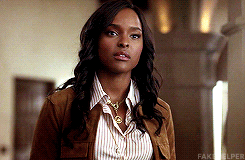
AILYN ZANELE YAXLEY really is the spitting image of ANTOINETTE ROBERTSON, right? For someone only 26 years old, AILYN has been forced to endure so much. Yeah, that PUREBLOOD has been scraping by at the sanctuary since JULY, 2028, working as a HISTORY TEACHER in the DIVISION OF CIVILIANS. SHE is a CIS WOMAN and is known to be INDIFFERENT and SECRETIVE but also INTELLECTUAL and ADAPTABLE. Best of luck surviving through this.
LINKS – pinboard, stats. playlist.
CHARACTER PARALLELS – elle woods (legally blonde), allison reynolds (all for the game), michaela pratt (how to get away with murder), sun bak (sense8)
TRIGGER WARNING – sexism, alcoholism, abuse, trauma, death (all have a trigger warning in-text too)
pre-outbreak
sexism tw || ailyn was born as the first child to andre and thandi yaxley, the first granddaughter to corban yaxley (who, at the time of her birth, was still rotting away in azkaban). she was wished for, kind of ----- her parents didn’t wish to raise children together, but did wish to have children so they could further their legacy. and then, of course, there was the fact that ailyn was a girl, which was a bit of a disappointment for andre yaxley, who wanted his firstborn to a son, because --- well, he’s instilled with traditional values that make no one happy (except him, i guess). || end of tw
andre yaxley is not a good man. he grew up in the shadow of his father ---- a successful death eater, who pulled the strings behind a ministry coup once, filled with a bitter wish for justice for him, angry that his father is imprisoned when he was so good at what he did, constantly hoping that the day will come where he can prove himself to be as good at scheming, plotting and cruelty as his father
spoiler: he’s not. he’s a useless piece of stale bread.
alcoholism tw || ailyn is raised in a web of lies. her father had inherited the once successful family company and had let it go bankrupt due to his incompetence, the shame that followed the family name and again, his incompetence, but did not speak of this: every day, he’d kiss his wife goodbye and go to work. but his workplace was the pub, and his work was drinking more beers than good for a man. her mother, who acted as if she was happily married to andre yaxley, smelled of other lovers when she came home from shopping or tea dates with friends.
ailyn is a smart child, an observant one, and figures out all the lies her life is built on quite early on in life. she learned how relative really truth is, how easy lies come. she confronts her father once, when he’s intoxicated and half asleep, and he tells her that he doesn’t have a job any more, that all the money they have comes from his parents-in-law, and he’s angry and disgusted and ailyn thinks he’s angry with her at first, but later understands that he just hates himself. (she would too, if she were him.)
abuse tw || but while he is mostly angry at himself, he does sometimes direct his anger towards his wife, towards his kids. mostly verbally, sometimes physically. || end of tws
her brother is born when she is five. he is a boy, and her dad prefers him, and she would like to say now that she never cared about her father’s useless opinions, but she did, and she hated it. but she loved her brother, even though he wasn’t as critical as she was, and kept truths from him because of it.
hogwarts rolled around, and ailyn was sorted in slytherin, though she was nearly a ravenclaw. she would have thrived in both, to be honest, but the sorting hat saw her ambition and self serving nature and thought her a slytherin more. she didn’t care either way. at hogwarts, she kept up her family’s façade, pretending that they were indeed like many other old pureblood families --- rich and thriving, despite controversy.
she was bitter, though, didn’t want feigned success and richness, wanted something to be really proud of -- not just those fucking lies. ailyn’s hunger for her own success was born then.
hogwarts was where she learned --- where she learned about her own power, and her lack of it. because here’s the thing: ailyn isn’t a good witch. she’s no good at wand waving and spells and any kind of practical magic besides potions. she understands magic --- delves into the theory of it and understands the tough texts --- and writes stellar essays, but when it comes to charming or transfiguring things, she’s shit. and honestly, ailyn has always had her doubts about blood purism but never pushed herself to actually doubt those ideals (because that’s what she was learned, and sometimes she’s scarily indifferent, and it puts her on a pedestal, and she didn’t mind that for a while), but when she sees that she -- a witch with so-called pure blood -- is no good at magic when others with so-called lesser blood are ten times better, she understands: it’s fucking bullshit.
she’s vague about her stance on it, mostly keeps her feelings hidden under layers of eye rolls and cynicism --- part of her is scared of word getting back to her parents, she supposes. another part of her likes being vague, too. an enigma.
ailyn also found her love for history at hogwarts. not because of binns, of course --- she wishes she could kill a ghost multiple times during her years in his class --- but because of the work she does herself. obscure parts of history are devoured by her in the library. she learns about muggle history, shamelessly, intrigued by the ethics and morals of humans.
ailyn might be a shit witch, but she’s very, very intelligent. she’s booksmart, able to read tough books with ease, able to write stellar essays and retain a lot of information at once. she likes learning theoretical stuff, likes getting her head dirty rather than her hands, and it’s because of that that she keeps passing her classes.
besides, she thinks that it’s more valuable to have a good set of brains than to be good with a wand.
after graduation, ailyn got an administrative job at the ministry, just to make a bit of money, not because she wished to kickstart a career there. she started interning under a historian, and once she had made enough money from her job to have a bit of a safety net, she moved out of her parents house.
and then she didn’t look back. she didn’t cut ties, not really, but she started sending letters less frequently. her relationship with her parents had only worked when she had been dependent on them, and now that she was no longer, she no longer had any interest in being close with them --- she hated her father, thought her mother a coward, knew that they didn’t care about her, not really, not as they should. and so a wedge grows. ailyn shows up for family dinners every now and then and keeps in touch, but she focuses more on her own life, her life outside of her family.
ailyn gained the title of historian when she was twenty two, and started writing essays, starting doing research, comparing patterns in muggle and wizarding history, writing for magazines and reveling in her own success. she builds her own life, in her small apartment in cardiff and does what she loves, and does it well.
outbreak
ailyn is working on her first book when everything goes to shit. she is in talks with obscurus books about a publishing deal, and is working on her first draft --- it’s a dream come true, and then everything goes to shit.
sexism tw || a bit of background on her family: her father and brother rejoined the death eaters, her father so fucking desperate to live up to his own father, her brother in his turn desperate to make his own father proud. ailyn isn’t even asked to join as well, because she’s just a girl, and she’s a bad witch at that. she doesn’t care. she doesn’t even want to join, anyway --- the death eaters are stupid, just as blood purism, and she doesn’t care that her father underestimates her because of her femininity. let him underestimate her. || end of tw
cardiff is overrun when she’s at home. she barricades her doors, her windows, everything, thinks that she can survive in her small home, sit it out, but it doesn’t fucking end --- there’s no government to fix this, no one is coming, no one is fixing this --- and ailyn is terrified. she can’t stay at home, but where can she go?
away. and eventually, hogwarts. she travels by foot -- and sometimes by car, or another muggle vehicle -- with a small group, made up of muggles and wixen alike. she doesn’t dare apparate, because she was never very good at it and she’s unable to get in the right headspace to even try. besides, she feels a sort of loyalty to the people she’s with. which ... is odd, because ailyn has always only felt loyal to herself, and maybe her brother, and maybe some of her friends --- and yet it feels good, amidst all the bad, so she sticks with them.
trauma and death tw || ailyn isn’t built for an apocalypse. of course, no one really is, but her weapon of choice is wit and words, and she can’t fight inferi with those. and so she fights with a bat, at times, rather than a wand. it’s not an easy journey --- of course it’s not --- and ailyn sees things that traumatise her; death and decay, and the inferi in general, and she’s not sure how she’s able to keep moving because she’s not built for this, she’s not, she’s not
she arrives at hogwarts in july, and has to prove that she’s not a death eater --- which she does with an eyeroll, even if she understands. she’s filled with trauma and grief, but she’s not the only one at least --- which is a strange comfort, but a horrible thing, too. she’s not sure how to deal with these emotions, though, because they’re overwhelmingly real, and before she was always able to choke her feelings down and ignore them, but now she shakes with them at times, and she doesn’t know how to talk about them, or what to do with them ---- theyre just there, these traumas and memories and feelings, and she can’t do shit about them. end of tws
ailyn becomes a history professor, teaching kids and teens, an infinite times better than binns ever could have. and she loves that. she finds comfort in that, that she can still do something with her passion. she returns to the library with warmth in her heart --- that’s the only good thing about this, she supposes, that she has unlimited access to the hogwarts library again (ye - she is a nerd)
it’s all ... a big learning experience, mostly. a way for ailyn to learn about the danger of her own indifference (which is fading more and more), a way for her to learn how to be compassionate without feeling like she’s weak, a way for her to open herself to people she wouldnt have looked at twice before
the circumstances suck though lmakldfhsjdf
personality & details
ailyn is a true neutral, powder pink lipstick lesbian who will drag your ass through the mud while speaking to you sweetly with a :) smile :). she has a mean streak and her nature isnt necessarily malicious but she can be when she chooses to. this streak most often shows itself in front of people that ailyn thinks lesser of/people that annoy her
she’s just … tired. tired of humanity and all the people around her and the ruckus theyre causing. ailyn just wants people to Chill Out and use their heads in stead of whatever’s motivating them ( their genitals, hearts, stomachs, whatever ). she feels very … Genius LMAO because she’s such a realist and she thinks she has the world all figured out when, obviously, she doesnt.
ailyn is very sure of herself, incredibly confident — sometimes too confident ( though she’s of the opinion that girls can never be to confident ) and in turn she can be condescending and haughty. she’s self aware, though, about most things. she knows where her strengths and weaknesses lie and has made peace with it, even knows that she’s arrogant and harsh, but doesn’t care much.
ailyn is hyperfeminine, believes in lethal femininity and the colour pink. very much elle woods in that sense — she loves fashion and make up and velvet high heels and looking good, but has a ready mind that she’ll apply to reach her goals at any given moment in time. will Not be underestimated because she’s girly (or, well, youre free to underestimate her, but you’re wrong and she cant wait to let you see that). a firm believer in the matriarchy. lover of womanhood.
she also … just thinks lowly of men a lot. like — her dad’s a deadbeat idiot alcoholic broke dude and he Sucks, and then there’s people like grindelwald and voldemort and a long string of ministers, prime ministers and presidents that just proof that men shouldnt be in power to her LMAO. her interest in history is mostly just ailyn sighing at the deeds of men and how they continue to disappoint her.
LOVES greek mythology and medusa is her #1 fave
emotionally constipated but less so than usual???? whew
she’s .... a nerd ... .... we stan
tbh she can be quite charming and fun to be around but she also can be all sharp edges and iciness ... depends on the mood, and who you are
idk i just love her and she’s ... rly living up to her potential here whew!!!
8 notes
·
View notes
Text
Annotated Bibliography
Winnicott, D. (1986) Home is where we start from. England: London
In this collection of essays we learn of Winnicott’s key teachings, presented to a lay audience. He explains attachment theory, the ‘good enough environment’, the contribution of the Mother to society, adolescence and the relationship between the individual and their facilitating family group. He explores concepts of health versus illness through his lens as a psychoanalyst in addition to to his medical background. It is extremely helpful to see how foundation concepts of personality, the very make up of human emotional development can be applied to such a variety of cultural topics such as monarchy, the Pill and mathematics. He brings clarity to these issues and offers me a model for applying depth of insight about the subconscious and the effect of early childhood environment on later life. By uncovering gaps or repression in the individual’s psyche the psychotherapist can facilitate milestones of developmental progress, albeit at a later stage of maturation.
Yalom, I. (2002) The Gift of Therapy. US: HarperCollins
This is a handbook of 85 tips and instructions built upon 35 years of clinical practice and teaching. He paints a picture of a therapist in a way that inspires me to rise to the challenge of training and the ongoing character growth that is so crucial to this profession. He promotes curiosity, humility and transparency, and breaks away the the image of the therapist as an all-knowing provider of interpretations, or a blank canvas to absorb transference. He gives a practical guide for mining the here-and-now aspects of the therapeutic encounter to further the process of therapy. He describes tools for incorporating the therapist’s own feelings into the mix as well as how to explore dream material, how to take a history and how to look at their present; how their daily life is organised and peopled. He writes with deep pride on the privilege of helping others find meaning, health and joy.
Skynner, Cleese (1983) Families and how to Survive Them London: Vermilion
This was a a whistle-stop tour through all the major themes of child development, identity, attraction, relationships and family dynamics written as a conversation between Robin Skynner, a psychotherapist and John Cleese his former patient. They discuss the continuum that exists with optimally healthy families at one end; dysfunctional families with inter-generational problems at the other; and the “normal” families in the middle in which we see an expected mix of ‘screened off’ feelings alongside coping mechanisms, defenses and social norms to smooth the way. Skynner draws on Freudian ideas as well as later work by more recent therapists and analysts who looked at how families work as a system. Each part affects all other parts of the system. By considering inter-relationships through the eyes of a typical family we can learn about letting go of inherited mistakes and move forward to optimal family life.
Van Der Kolk, B. The Body Keeps the Score, United Stares: Penguin
This book is about how trauma impacts a person causing long term suffering to victims, their families and future generations. Using scientific methods such as brain scans and clinically sound investigations, Van Der Kolk looks at how the mind and body are transformed by traumatic events; how neural networks are formed as coping mechanisms and may later morph into unwanted behaviours. This is followed by a paradigm of treatment that seeks to give individual patients ownership of their narrative, their bodies and a route to self awareness and healing. Yoga, EMDR, neurofeedback and theater are offered as examples of pathways to recovery and I believe that art therapy is another good candidate for an embodied type of therapy, one that does not rely on talking alone. This book answered questions about my own pattern of mild symptoms and has opened up the whole field of mind/body connection in relation to trauma and healing.
Axline, V.M. (1964) Dibs In Search of Self. London: Penguin
Virginia M. Axline has written the true story of Dibs, her client; a talented and sensitive child who was trapped in isolation due to the lack of emotional connection in his life. Through psychotherapy - play therapy to be precise - he regained his sense of self and was eventually able to thrive, utilise his gifted nature and contribute to society. It is an eloquent case study obliquely laying out the principles of play and art therapy. The therapist built the safe environment in which the child could open up and slowly verbalise his deeply felt emotions. reparation with his parents blossoms. It is notable that the therapist made it safe for Dibs to express negativity. This teaches us to think about hostility as a sign sometimes of adequate ego strength for the feelings to be articulated. In that sense, aggression is a sign of health! This book is a beautiful testimony to the power of psychotherapy to transform lives.
Malchiodi, C. (2011) Trauma Informed Art Therapy and Sexual Abuse in Children. In: Goodyear-Brown, P. (ed.) Handbook of Child Sexual Abuse: Identification, Assessment and Treatment. United states: John Wiley & Sons
This chapter deals with how art therapy helps children who have suffered sexual abuse to articulate their sometimes unutterable experiences in a manner that the therapist can understand while within what is tolerable for the child. Trauma informed art therapy involves using art materials to address hyper-arousal and to teach relaxation, referencing the specific neuro circuit that is activated by hands on activities of a soothing nature. The sensory and tactile qualities of art materials need to be taken into consideration, how they are central to trauma recovery, but equally how they may trigger memories of distressful events. The somatic approach, using colour and shape enables children to locate the place in the body where trauma is held so they can learn to diminish distress. The author comments on the relevance of culturally sensitive materials and projects. This has been a rich article for me, linking my reading on trauma, with art therapy for a client group I may want to work with in the future.
Cane, F. (1951) The Artist in Each Of Us. United States: Art Therapy Publications
This book bridges art and therapy. It aims to give the reader a means to achieving a richer art and a more integrated life. It looks at how movement, feeling and thought work together. I was intrigued to read detailed technical instructions for accessing subconscious material which can be used to reach higher levels of artistic expression and also personal healing. The case studies record the progress of her students and how transcendence was coaxed up through fantasy, play, rhythmic movements, chanting and other indirect means until it could be released for union with the conscious. I tried out some of these techniques and was surprised to discover not only the catharsis, but also the unexpected outcomes of artwork spontaneously arising from my own psychological material. It shows me how the perceptive teacher can awaken in her students their own creativity and direct them to find solutions for subtle or complex inner dilemmas.
Dalley, T. (ed.) (1984) Art as Therapy. An Introduction to the use of art as a therapeutic technique. London: Routledge
This book is an introduction to the theories that underpin art therapy and is broad in it’s range of contributing authors. We get an outline of the role of art within a therapeutic framework, the manifestation of art as play, as a language of symbols and development. The historical links between art education and art therapy are explored; the differences and what they have in common; and a possibility for merging the two fields. Each chapter on a specific client group offers insights for working with these vulnerable people in a way that will give direct therapeutic benefit.
I found the chapter on art therapy in prisons to be particularly enlightening. The author was clear about the actual constraints of working in that environment, what the pitfalls might be and she presented practical guidance on overcoming them. She promotes a vision for how arts can transform the most ant-social of prisoners into creative, productive people; this raises pertinent questions for the current justice system.
Price, J. (1988) Motherhood, What it Does to Your Mind London: Pandora Press
A fascinating book delving into the psychology of mothering written by a female psychiatrist and psychotherapist. It ties up the concepts of attachment theory with the realities of modern relationships and societal expectations. It is presented through the lens of a Woman, a woman who lived through her own mother-daughter dynamic, pregnancy, giving birth, breast feeding and the like. She looks at how our culture and family story play out in our own lives whether consciously or unconsciously. By normalising much of the natural difficulties of mothering, this book can offer solace in trying times.
I am a mother of four boys and pregnant with my fifth child, so I am justified to claim that his book ought to become mainstream knowledge. It is through lived experiences that we can most genuinely form opinions and then reach out to help others in a professional capacity.
Case, C. Dalley, T. (1992) The Handbook of Art Therapy London: Routledge
This handbook is a bird’s eye view of the profession. It covers the theories of psychoanalysis and how it intersects with art as well as a detailed look at the practical aspects of employment as an art therapist in jargon-free language. This gives a beginner art therapist a survival guide for those inevitable first forays into work. I gained a grasp on the complexities surrounding room set-up or lack of appropriate dedicated space. A how-to guide on various forms of note taking making use of the same example session throughout the different formats was extremely helpful. There is clear preparation for supervision, referrals, working in an institution, operating as part of a team versus being isolated and potentially being misunderstood. Reading this was an important step towards becoming a competent practitioner.
3 notes
·
View notes
Text
This is going to be a really difficult introduction to my wrap up.
Unfortunately, on September 18th my dad passed away. He was only 50 years old. I won’t go into details because of how personal it is, but he was in hospital a majority of the month before he passed. I’ve taken a year suspension from University for the time being.
It has been a really difficult time for myself and my family. I’ve turned a lot to books and blogging to offer a way to occupy my mind which is why so many things still seem to be coming out, but I cannot say that this will hold up after the funeral.
As I schedule so many posts, a lot of what came out this month has been written since around mid August and I did not find the time to stop the University posts before they were released. I won’t be deleting them.
I hope you’ll all understand.
THINGS I’VE READ
An Inspector Calls by J.B. Priestley– My sister gave me her copy she used for her GCSE’s. Such a great play with revelation after revelation, left me on the edge of my seat. While I knew the core plot twist, I didn’t predict that ending.
Mob Psycho 100 Volume 1 by One– This was kind of meh. It’s one of my best friend’s favourites, so I’ll carry it on eventually, but I don’t really feel the urge to pick volume two up just yet. I will say I like how the anime tackles the same events in a different order to save major revelations for backstory– that was really interesting to pick up on.
I Call Upon Thee by Ania Ahlborn– I really didn’t like this! Lacklustre and very cliched, feel like it doesn’t really offer anything other than annoying ending and characters who go through absolutely no development at all.
Kissing Tolstoy by Penny Reid– An OK romance that actually has discussions surrounding reading and books that don’t feel forced. I found this easy to read even though I’ve never read any Russian Lit, and I actually want to read it more now. Like that it discusses age gaps and issues of the power dynamic too.
Seven Tears at High Tide by C.B. Lee– Finally finished this one, and it only took me 3 months. A very cute and heartwarming story about a boy who makes a wish and falls in love with a Selkie. Does get ridiculous at the end, I must say, but I was happy with the payoff.
The Tea Dragon Society by Katie O’Neill– Katie O’Neill creates such amazing narratives that have wonderful messages about society and being true to yourself and your wishes, pursuing something that you love and encouraging others to do the same.
Rosemary’s Baby by Ira Levin– How can I ever trust a single man or old person after this book? Tell me.
Please Undo This Hurt by Seth Dickinson– Don’t really rate this short story. It bored me and I hated the main characters, not even in a good way. Just perpetuates the ‘I can save you from your mental illness’ narrative that is dull and overdone by this point.
My Hero Academia Volume 20 by Kohei Horikoshi– Gentle Criminal and La Brava was so boring, the School Festival arc was fabulous, and Endeavor finally got his ass kicked! Yay!
Aphrodite Made Me Do It by Trista Mateer– I have a review of this coming out soon for National Poetry Day in the UK, but if you don’t want to wait, I have a review here!
The Quiet Boy by Nick Antosca– I read this after watching the trailer for Antlers, and I thought it was pretty neat! Very thrilling, although I’m bothered by changes being made in the film that I feel could detract from having Julia as one of the main characters in the film.
I Am Not Your Final Girl by Claire C. Holland– A collection of poetry centring around fictional women from horror films, exploring their empowerment and agency in a genre and a wider culture and society that seems willing to beat them down until they break.
Alice Isn’t Dead by Joseph Fink– I have a review of this linked later this post! Full of body horror and emotional trauma, this is a really solid read great for fans of the podcast and Welcome to Night Vale.
In the Shadow of Spindrift House by Mira Grant– I love this terrible cover! Keep an eye out for my review of this, it’s coming out soon.
The World’s Greatest First Love Volume 1 by Shungiku Nakamura– The publishing elements and the main character were GREAT, but there is prevalent sexual assault in this that is never addressed and is incredibly insensitive in its treatment, so I don’t recommend this manga.
Dead Voices by Katherine Arden– I didn’t enjoy this one as much as Small Spaces, but it’s still really freaky and a great middle grade read. I love that Coco gets her own POV in this, too, and that it doesn’t take stereotypical routes with some of its plotlines.
No One Is Too Small To Make a Difference by Greta Thunberg– This is a collection of speeches Greta Thunberg has made addressing climate change, as well as her own position as an advocate for the cause. Moving and a must read, in my opinion. It’s only £3 in Waterstones at the moment for anyone who wants to pick it up!
Zen in the Art of Writing by Ray Bradbury– A fascinating collection of essays written by Bradbury about his writing process and some of the more popular works he’s published. I honestly felt really inspired and motivated after reading this, I highly recommend it especially for creative writers, but just be warned it is very oriented around the white male experience.
Heartstopper Volume 2 by Alice Oseman– I adore Heartstopper and I love this second volume. Great progression in the relationship between Nick and Charlie, and we’re getting to see more outside of their relationship and into their friendships and family dynamics, too. I still love Tori Spring!
The Adventures of Sherlock Holmes by Sir Arthur Conan Doyle– Finally got a hold of the MASSIVE audiobook where Stephen Fry narrates all the Holmes stories, and it honestly made the experience so much more enjoyable. I think Doyle’s skill lies more in shorter fiction than longer fiction, I think there’s less opportunity for… not useless, per se, just unneeded waffling.
Giant Days Volume 9 and 10 by John Allison– These two volumes take place around the tailend of the girl’s second years and follows their accommodation location, the progression (and breakdown) of relationships, and them finally making it to third year intact. I honestly can’t believe there’s only three or four volumes left in this series, its been a constant companion for me since 2016 when I first started and I really don’t want to let it go.
No Touching At All and Even So, I Will Love You Tenderly by Kou Yoneda– Of the ‘older’ manga I’ve read that focus on the relationships between two men, these two are definitely in the ‘recommend’ pile. Other than the beautiful names for the volumes and the artwork being really pretty, I really enjoyed the developing relationships and the conversations had about workplace homophobia and ostracization in Japan, although that wasn’t the main focus. They do include some questionable attitudes towards identification of sexuality– two characters in both volumes are probably bisexual or on that spectrum, but are referred to as straight more than once for liking women and only the man they enter the relationship with. It’s complicated, but nothing in either volumes ever feels targeted or hateful, just lacking education on the nuances of sexuality.
Articles
I found this article about Friends great as it breaks down issues I’ve had with the show for years. I don’t have a lot of attachment to it, honestly, I mostly just put it on in the background, but I think I’ll stop now. I’ve always found the handling of gender and sexuality damaging in Friends, as well as the overwhelming fatphobia.
I really enjoyed looking through this list The Guardian did of the 100 best books of the 21st century. I don’t know why, I’m just a big fan of lists!
Before reading this article, I can honestly tell you I knew nothing about Susan Sontag beyond her name. It’s deconstructing her queerness and how her aversion to accepting her own sexuality ultimately ruled a lot of the work she produced in her life.
God, this article was fascinating. I can’t even tell you what it’s about, really, other than that it’s an interview with Christeene, a punk drag artist who is just really cool, honestly. There are some buttholes for anyone who… wants to avoid butts? Or reading this at work?
There was a massive conversation in August that carried into September regarding the rise in men adopting pseudonyms to get their thriller novels published. This Atlantic article particularly captured the issues I have with men who do this, who are almost trying to fool an audience of women who trust women writers to not approach the suffering of women through a misogynistic lens, as is so common in modern society.
An older article by The New Inquiry, Coming out of the Coffin offers an insight into the fraught relationship between Bram Stoker and Oscar Wilde. A really interesting read, I’m just sad I discovered it 7 years after its release!
THINGS I WATCHED
I don’t do music sections on these wrap ups anymore, so I’ll put this here: the GRAACE cover of ‘Complicated’ by Avril Lavigne completely transforms the song and adds such an amazing depth to it
I decided to binge watch Fleabag and it’s most definitely the best decision I’ve made all year. Fleabag follows the titular woman as she navigates her life as a thirty year old woman whose entire life is in flux, and has been since the death of her mother. There’s a lot I could say about this show, honestly. What really stood out to me was how much I could relate specifically to the emotions Fleabag and her older sister Claire feel in relation to each other, and their grief. Seeing them still come back together even after such a significant loss, their dependency, really gives me strength to get through what I’m experiencing at the moment, so Fleabag has been something I can relate to and look at as hope for a future where I can begin to wrap my head around the terrible things going on around me.
THINGS I POSTED
August Wrap Up
TTT: Books Outside My Comfort Zone
50 Bookish Questions Tag
Music I Enjoyed This Summer
Connie’s Personal 101 Guide For Personal Survival of University
Bookshelf Tour Part 3: TBR & More Manga/Comics
Book Review: I Call Upon Thee by Ania Ahlborn
TTT: Books on my Fall TBR
Book Review: Alice Isn’t Dead by Joseph Fink
Bookshelf Tour Part 4: CDs&DVDs
If you liked this post, consider buying me a coffee? Ko-Fi.
Goodreads|Twitter|Instagram|Letterboxd
September Wrap Up This is going to be a really difficult introduction to my wrap up. Unfortunately, on September 18th my dad passed away.
1 note
·
View note
Text
Context to the video ‘Not Coping (Conversation over Lunch with Mum) Video 1/1 on me, her, and MND’
In the video (please read the description on Vimeo and then this before watching AND before reading this - trigger warnings are on the video link page) my mum is surprised because she doesn’t think I’m a panicky person. I explain to her the trauma and panic I kept secret when I knew she was terminally ill. I knew this for sure about 5 years ago exactly (November 2013) although the official diagnosis came two years after that (late 2015). The context of this video discussion is that my dad died suddenly on 22nd October 2013 and my mum went for what she thought was a relatively routine nerve conduction study to get to the bottom of why she had a weak grip and muscle wasting in her right hand (we thought nothing of it) a week or two after my dad’s funeral.
As soon as that study was done and I saw the reaction of the consultant and his refusal to tell us what was wrong with her I knew something was wrong. I pressed him and he said “she has generalised muscle weakness that she’s not noticed. I will write to your GP and I cannot diagnose her”. I categorically do not recommend self-diagnosis or diagnosing others. But I went home and started researching. I did not yet recognise that my obsession with diagnosing her and processing her terminal illness before the official diagnosis was a symptom of my ill health at the time.
But I went home and started researching. I still had institutional log in access to academic journals because I’d taken an immediate, and what I thought was an indefinite leave of absence from my PhD at Royal Holloway upon the death of my dad from a sudden heart attack. I concluded that she had Motor Neurone Disease and, based on her age and accounting for large data sets in studies into MND and mortality that she had 2-3 years to live at best (only 10% of sufferers live a decade or longer with the disease and they tend to have been diagnosed at a younger age) and that she had the worst disease imaginable. I was not and still am not a doctor and so this diagnosis and its obsessions was a mistake. But it has been born out in reality. She has now been living with MND for 5 years. Don’t diagnose yourself or others around you. Wait and see until you’re given an official diagnosis. You can deal with whatever it is and carrying a burden of thinking that you or a loved one has got something awful wrong with them before you actually know for sure is quite literally (I choose that word carefully) unbearable.
Putting that advice aside (I hadn’t taught myself it back in late 2013) my mindset at that time was that my dad had just died suddenly (I was grieving) and that I’d ‘found out’ that my Mum had an awful, awful disease and only had a few, increasingly unwell years left to live. The progression of the disease results in progressive and near total paralysis and respiratory failure with no effect on cognitive functions (usually). I resigned myself to quitting my PhD, or radically reformulating after her death, moved home from Oslo, and threw myself into being a chef at a Michelin starred restaurant in East Yorkshire. I knew I needed to work and to do things with my hands and to be part of a team. And I knew that the trauma I was experiencing would only get worse (or thought I knew) and I couldn’t even face the idea of reading a book or writing or researching or thinking about banal corporate art in airports, or returning to a different country away from my mum during the process of her dying. And I knew that she was dying 18 months before she got the official diagnosis.
In the video I discuss how I COULD NOT HANDLE (the only time I’ll ever capitalise for effect, I promise) all of this knowledge and grief and the anticipation of trauma pressing on me. We discuss coming to terms with terminal illness (there’s a lot of happiness still to be had) and not bottling things up. I’m currently detoxing from benzodiazepines and I explain how I started using drugs like that in the video too. The video is mainly audio and out of focus. 2 years ago I started trying to make a ‘proper’ film about my mum, bought a v expensive DSLR and audio recording kit and was totally paralysed by the responsibility I felt to make the right kind of film. All that thinking was total bullshit internalised on the basis of what I thought was expected of me. Fuck that.
This is important too for context of starting, just starting, to make work about me and my mum and MND:
On New Year’s Eve of 2018 (nearly 3 weeks ago) I started to draft a Facebook post thanking the people really close to me for giving me joy this year. I realised I could not do this without explaining why I’ve needed so much support over the last 5 years. So before I knew it I’d written 2000 words and the fireworks were going off on the TV and the essay had turned into the detailing of my dad’s death and my mum’s diagnosis so that the people I was thanking could understand why their support and inspiration has been so important to me, and especially how the joy and pain I have experienced in the last 18 months has been so important to me as healing. I’d also gone off on tangents, written really angry paragraphs about a perceived lack of support from Royal Holloway in the two years after my dad died (they terminated my PhD on a technicality) and still not gotten to thanking anyone.
That essay of trauma and thanks would probably reach 10,000 words and nobody would read it. I’d put it on social media and tag all the people and then they’d feel obliged to read it and that might be a burden. Plus, I’ve decided that having conversations like this with my mum is a better way of exploring issues of anxiety, depression, substance abuse, terminal illness, bereavement, family addiction, panic, perhaps undiagnosed PTSD on my part, and love, and joy, and pleasure. (We’re doing really well, by the way)
I am only able to do this because I have got much better mental health now because I sought help after a panic attack in Spain (discussed in the video). But I am also fully aware that I am also only able to do so because of the amazing support I have received over the past 5 years from family and friends. I believe in situating one’s knowledge and that means acknowledging what makes it possible for me to be able to speak, to film, to function, to not collapse. It is especially over the past 18 months that I have met fearless artists who speak from the heart and seem to be brave without limits. I realised that I could be brave too and just say whatever I wanted to say about my life however I wanted to and that I couldn’t care less if anyone thought I was stupid or my speaking had no value or that I wasn’t worthy of being heard.
But I do care if this kind of story telling is useful for other people dealing with similar issues. I don’t want to cause harm. If you think I’m causing harm I want to listen to you. Please contact me.
So, here is all that thanks without that bothersome tagging that can seem as much selfabsorption as genuine and radical gratitude. I’m thanking these people either because they have always been there for me and are unequivocal friends who I can rely on and put my life in their hands if I need to, or because they’re amazing role models and have given me hope and fire and zest and inspiration. I’d become a person who hid for a few years. I’m not hiding any more.
It’s no coincidence that the majority of people I’m thanking are woman. I hope I can give as much as I can take.
Thanks to, in no order of importance, Tom Williams, Rosalind Williams, Claire Stansfield, Jon Stansfield, Phil Johnstone, Cogs Stansfield (no relation, I think...) Dan Morris Lea, Natalie Morris Lea, Kathryn Thomason Stripling, Richard Thomason-Stripling, David Parkinson, Rachel Houmphan, Max Houghton, Lewis Bush, Jane Thomason, Grace Oni Smith, Jasmine Johnson, Vivienne Griffin, Lisa of @BlueBagLife (sorry I don’t know your surname!), and Rachel Pimm. I’ve hyperlinked to your work to point anyone who might have gotten this far to how AMAZING it is!!!
If I believe people should insist on welcoming an unexpected guest three times then I should give thanks three times too. Thank you, thank you, thank you.
There’s joy in the video. If you’ve got this far I hope it’s useful.
#terminal illness#motor neurone disease#MND#documentary film#gratitude#family#mums#friends#art#essay
2 notes
·
View notes
Text
Minority Representation in “Supernatural” - A Look at Disability
Supernatural is infamous for its ever-changing cast. In a universe plagued with deadly monsters and body-stealing angels and demons, each episode holds the potential for a radically different array of actors to fill its characters’ roles. However, it is no secret that, like many other tv shows in mainstream media, Supernatural lacks diversity.

Supernatural has often been criticized for its lack of representation. It’s official main cast, for example, has been exclusively white through all its thirteen seasons. Of its nine leads, only two characters have been female (and they have long since been killed off the show). Overall, Supernatural’s issue with diversity is often obvious even to the most casual of viewers.
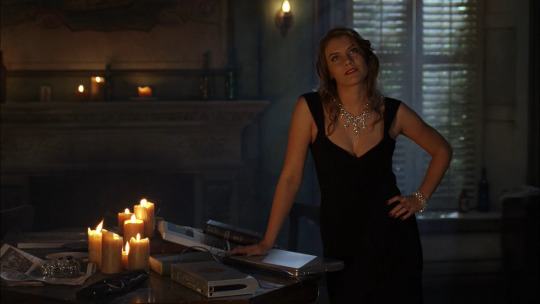
(Bela Talbot - An expert thief in the world of Supernatural. Played by Lauren Cohan. Was recognized as a main cast member through Season 3).

(Ruby - A demon that takes a human vessel to help the Winchesters. Played by Katie Cassidy and Genevieve Cortese. Was recognized as a main cast member through Season 3).
For its credit, Supernatural has made visible efforts to write in more minority characters over the years. Charlie, Billie, Kevin, Cesar, and Jesse are just a few examples of the show attempting to represent diverse sexualities and ethnicities within its episodes. Yet, many of these identities are left to minor and background characters that are usually written off the show sometime later.

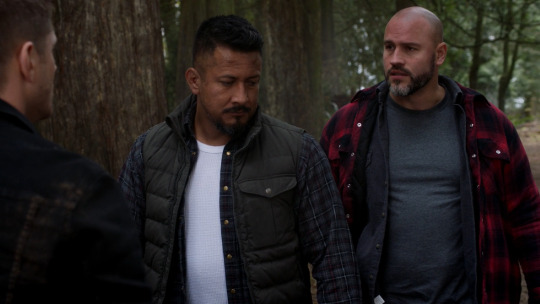
Within this essay, I will analyze another minority identity Supernatural has explored through its years - individuals with disabilities. Specifically, I will be focusing on the characters Bobby Singer (Season 5) and Eileen Leahy (Season 11-12). Through these two characters, I will analyze how Supernatural’s representation of those with disabilities has changed throughout the years, and how these characters relate to the broader topic of ableism.
Bobby Singer
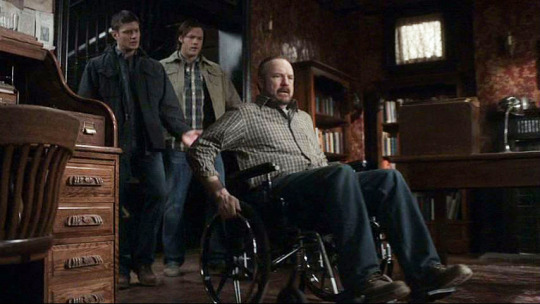
When the audience first meets the retired hunter, he is able-bodied. Bobby’s backstory is that he’s been hunting for many years, chasing and killing monsters similar to the way Sam and Dean do in the show. In his older years, Bobby is shown often acting as an educational resource for the brothers, helping them research cases and answering phone calls with their questions. Labeled as “an old drunk”, Bobby nonetheless proves to have a deep-rooted sense of responsibility for the Winchester brothers, often acting as a father figure to them.
It is this protective nature that causes Bobby to stab himself in the legs during Season 5 to rid himself of a demon possession (and thus, in the process, save Sam). The action, however, leaves him wheelchair-bound throughout the remainder of the season.
Bobby was one of the first recognizable and textually confirmed main characters to appear with a disability. In many ways, Bobby was the first example of how Supernatural explored representing non-able bodied characters.
Bobby’s first reaction to his new disability is extremely negative. In a scene where Bobby stares idly out his hospital window, Sam whispers, “[Bobby] hasn’t spoken in days”. When the angel, Castiel, appears soon after, Bobby’s dialogue has him anxiously awaiting heavenly forces to heal him from his disability. When it’s discovered he cannot be healed, Bobby responds in anger and frustration.
BOBBY
You're telling me you lost your mojo just in time to get me stuck in this trap the rest of my life?
CASTIEL
I'm sorry.
BOBBY
Shove it up your ass.
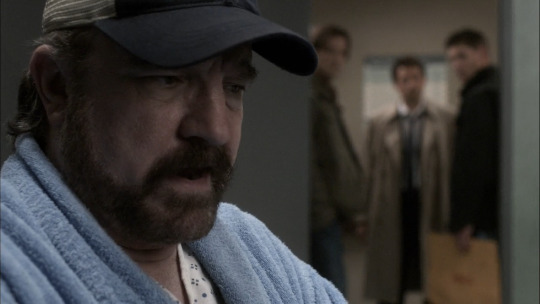
Throughout the season, Bobby’s response to his disability continues to spiral into negative, depressive episodes. In 05x07, “The Curious Case of Dean Winchester”, Bobby makes the risky decision of gambling with a witch to earn back his ability to walk. Instead of money, Bobby bets years of his life. After the game, it is revealed Bobby gambled, and lost, 25 years, leaving him on the cusp of death. While the deal is reversed with the Winchesters’ help, Bobby still retains his disability by the end of the episode.

Bobby’s depression soon becomes textualized after he admits to thoughts of suicide. In 05x07, he claims,
“I ain't a hunter no more. I'm useless. And if I wasn't such a coward, I'd have stuck a gun in my mouth day I got home from the hospital."
In 05x18, “Point of No Return”, Bobby is also seen holding a bullet, telling the Winchester brothers,
"That’s the round that I mean to put through my skull. Every morning, I look at it. I think, 'Maybe today’s the day I flip the lights out.' But I don’t do it. I never do it. You know why? Because I promised you I wouldn't give up!"
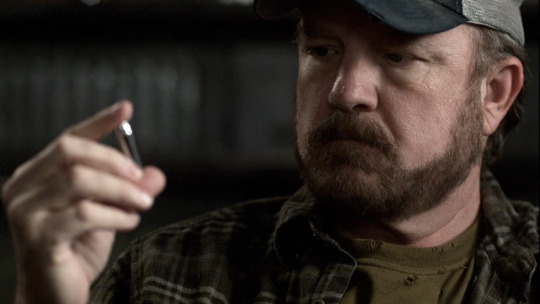
These two quotes reveal that Bobby’s suicidal tendencies are linked to the day he discovered he could no longer walk. For Bobby, his disability completely invalidates his identity as a hunter. In his mind, the two identities cannot coexist. His disability leaves him feeling incapable of doing his job and protecting those he loves. For Bobby, his disability correlates to weakness, uselessness, and passiveness. These feelings are so extreme, in fact, that by 05x18 the only reason Bobby hasn’t ended his life is not for his own sake, but for the sake of others.
Bobby’s suicidal tendencies can be noted later in 05x20, “The Devil You Know”. In this episode, Bobby makes a deal with a demon to help the Winchesters. By doing so, he sells his soul and faces the chance of spending eternity in Hell. Bobby’s actions speak of duty, but also a lack of self-worth.
BOBBY World's gonna end. Seems stupid to get all precious over one little...Soul.
However, by the end of 05x21, “Two Minutes to Midnight”, Bobby regains his ability to walk through the demon deal. The change leaves Bobby feeling happy and hopeful, even telling Dean,
“I walked up and down stairs all night for no damn reason. I'm sore. Feels so good, I'm scared it's a dream.”
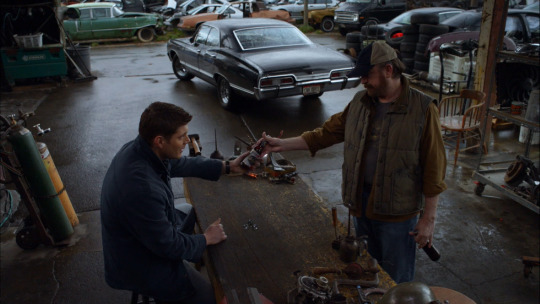
Overall, Bobby’s reaction to his disability is typical of most media. By obtaining this disability later in life, Bobby is a reminder that able-bodiedness is, and can be, a temporary state. Once Bobby loses his ability to walk, he is shown as incredibly depressed with suicidal tendencies, risking the lives of himself and others just for the chance to walk again. By doing so, the show gives a single image of disability, which is one full of pain, sadness, and the desperate chase to find a “cure”.
Supernatural’s representation of Bobby’s disability can be linked to ableism - the system of power in society that gives privilege to able-bodied individuals. Bobby’s character falls into many of these media stereotypes. He is shown to be incredibly depressed because of his disability. His self-hatred is so low, in fact, that he values death over having to live with his inability to walk. His newfound disability characterizes him as weak and useless as well. Despite having hunted his entire life, Bobby’s character claims that his disability invalidates this entire side of his identity. Instead of exploring the ways Bobby could adapt to hunting after his disability, his character is shown completely unwilling to even try. In this way, Supernatural is essentially showing us that individuals with disabilities simply cannot exist in the “hunting world”. Like many other parts of society, hunting is portrayed as inaccessible to the non-able bodied community.
Bobby’s obsession to find a “cure” to his disability is an example of ableism as well. It retains the pattern in media that those who are disabled are constantly wishing for, and searching for, a “cure”. It is part of a societal belief that able-bodied is a standard every individual aspires to. If one does not fit this image, then they must be constantly searching for a way to achieve this standard. This belief fuels the idea that non-able bodied individuals are somehow abnormal from the rest of society. In Supernatural, we can see this stereotype played to the extreme through Bobby’s suicidal gambling game.
By the end of the season, Bobby’s disabled status is given no redemption. He’s not shown working through his emotional trauma nor finding any sort of emotional conclusion. Instead of self-acceptance and exploring new ways to hunt, the show’s “solution” to Bobby’s disability is to magically erase it. Afterward, Bobby is seen as finally happy and optimistic, making jokes and comparing his re-ability to walk like being in a “dream”. In this way, Supernatural reasserts the stereotype that those with disabilities can only be happy once they are able-bodied. Overall, Supernatural’s Bobby Singer represents the many negative and harmful stereotypes of disability in our mainstream media.
Eileen Leahy
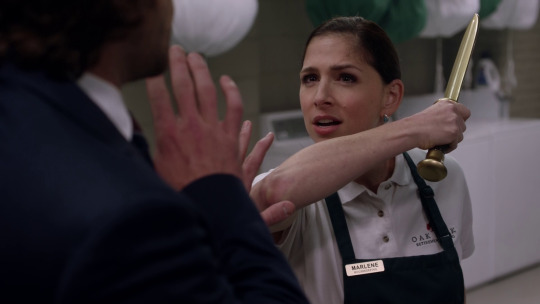
Eileen Leahy first appears in 11x11, “Into the Mystic”. After Bobby Singer, she is one of the only recurring characters on the show with a textually confirmed disability. When Eileen was a baby, a banshee invaded her home and killed her parents. While Eileen managed to survive the attack, the banshee’s supernatural screams left her deaf. She was later found by a hunter who raised Eileen into the world of hunting. Eileen’s character is first introduced to the show when she and the Winchesters work on the same case; both hunting the banshee that killed Eileen’s family.
Eileen’s character is given incredible complexity despite her only one episode introduction. The episode opens with the scene of her parents’ death, allowing audiences to empathize with Eileen’s history. Throughout the episode, Eileen also discusses important topics to her character, like her background in hunting and her feelings of revenge.
SAM
Eileen, in my experience... Revenge is not all it's cracked up to be.
Killing this Banshee is not gonna bring your parents back.
EILEEN
I never met them. They're just pictures to me.
[Eileen picks up her wallet, opens it to a picture of her as a baby with her parents and hands it to Sam]
SAM
But...
EILEEN
They're family.
My family.
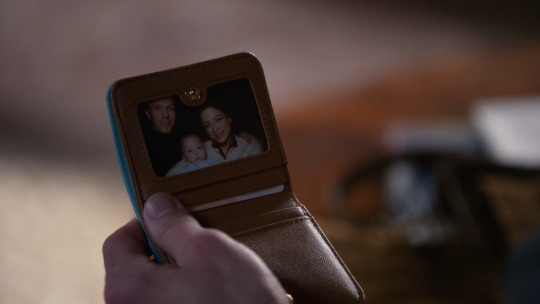
By providing all this, the show invests in giving her a complex backstory and provides explanations to the motivations behind her actions. This is rare for the show’s usual treatment of new introductions, reserving such plotlines for major characters.
Eileen even talks about her future, contemplating about becoming a lawyer. But, by the end, she accepts that her future remains in hunting.
SAM
What now? Law school?
EILEEN
No. This is my life.

Eileen’s character represents a minority identity. The complexity given to her character, therefore, is important to recognize. Instead of becoming a two-dimensional image of her disability, Eileen is recognized as a real life, dynamic individual. While deafness plays an important role in Eileen’s character, it is an identity layered upon other characteristics for the audience to empathize and understand her through. The show’s attention to Eileen’s character, therefore, is a successful step towards the positive representation of individuals with disabilities.
Most importantly, in fact, Supernatural shows Eileen fully capable and happy with her life alongside her disability. There is no focus on her character being “cured”, nor does Eileen show any negative thoughts against her deafness. Instead, Eileen is confident and resourceful, proving herself a force to be reckoned with.
Throughout the episode, Eileen shows incredible talent and skill in hunting. She is reliable, courageous, and strong-willed. During the episode, Eileen doesn’t hesitate to lure Sam into a trap of runes she’s painted, mistaking him for a banshee. By doing so, Eileen becomes another character in the show that is able to outwit the Winchester brothers, who they themselves are considered at the top of the hunting world. It is only by Sam explaining her mistake that he is able to escape from her trap.

As well, Eileen’s deafness serves as an advantage to the case. When the banshee’s screams become too loud for any of the hunters to hear each other, Eileen is able to communicate the directions to a spell using sign language. In this way, Eileen’s deafness is not shown as a limiting factor to herself or her work. Instead, it represents the advantages and strengths Eileen has because of her identity. This can be contrasted heavily with Bobby’s character, who felt he was no longer a hunter due to his disability. As Eileen shows, individuals with disabilities can (and do) easily exist within the hunting world.
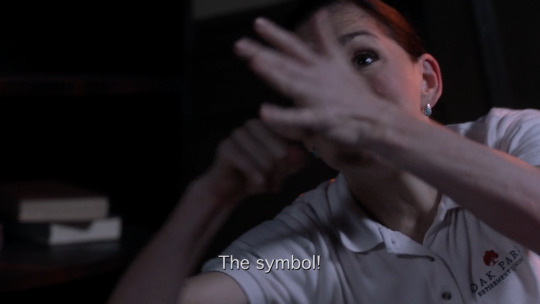
Eileen’s deafness is explored in many ways throughout the episode. The show even brings great attention to Eileen’s experience with deafness by allowing her to communicate in sign language with another character. Sign language is not just another form of communication; it can be part of an entire culture in deaf/hard-of-hearing communities. Allowing Eileen to sign throughout the episode brings a greater understanding of Eileen’s experience with deafness.

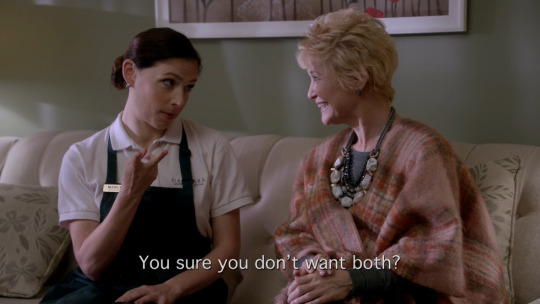
Overall, Eileen’s characterization in Supernatural is a progressive step for a show that previously failed in positive disability representation. By addressing disability, Supernatural gives voice to a group that greatly lacks such recognition on screen. For individuals within this community, characters like Eileen can represent a hopeful future of better disability representation in media.
7 notes
·
View notes
Text
So I think I’ve done more Chinese writing than I’ve had in the past five years during last month. It was... exhausting, but I also enjoy spinning it a little rewriting the novel in a different language.
Now I’m actually writing a full length prose, one can finally see the trauma left by my middle school teacher. There’s like, at least 30% idioms in my chapters. I just, I’ve been conditioned into stuffing as much idioms as I can UNDER JUST A YEAR, and there’s no turning back. I mean, yes, idioms are excellent to convey ideas concisely, but they could be pretentious if overflown; especially when you write in a language that leans towards colloquialism as Cantonese. I just know a lot of idioms and sometimes it’s difficult not to use these minimalist words? I know where the line lies though. It’d be good to sum up an event, but re-consider if they are superfluous adjectives.
Well, getting into this mess did inspired me to write two poems and a drawing, so I guess it has some benefits in the end?
Onward, I do miss writing English fiction so bad. I wrote a few essays in the meantime, but the last time I wrote a story was what? last summer? I should just sit down and write it like I’m doing now. I’ve been watching a ton of panels & interviews stuff, digging up the gems of Star Wars weekends. It’s hilarious and I want to make a non-show TCW resources masterpost later on. But just combing through that comics list is quite a work, and I have to sort out the download links. yeah.
But like, I meant to talk a little about lunar new year in the diary post. And I actually have something never fully plumbed in my draft regarding some... rumour that I’ve now forgotten. Well, I want to say that it’s been a hectic month. I barely know what I did since the year started. Life’s still shit, but it’s very oblivious, you know. I don’t need to go into details here, it won’t change anything overnight. Just so if anyone’s reading, I’m of sound health, just moody.
Let’s talk about something I haven’t even discussed inside my own head. So the past month, we’ve basically been helping my gramps move and renovating our own house as well. Very often we worked very late and it completely drained me. But I know Mom is working a lot harder than I am and I want to do my best to lessen her worries. In principle, I would gladly help out but it’s this, tcwaw, the translation, and the deadline of making a cny outfit, and mom breathing down my neck to exercise with the fam, plus having my hair cut in three years rather unwillingly, on top of my terrible self-maintenance (and that ever-lasting shadow of my college). phew, it’s a lot. and I got really, really depressed because I couldn’t finish tcwaw. I feel like, I’m betraying a pact or something okay. I know I took this too seriously and well, any day is tcw appreciation day here. but I tried really hard to make something and I really wanted to complete the challenge, to do this together. So at least, I’m letting myself down. and then there’s the fact that the first post didn’t garner as much notes as I wanted... but all of them are quality responses so thank you... (brb crying again)
Next, I’ve bitched about this many, many times but the negativity of the Forum! Like, pal and i are trying very hard to sway it back into some positive discussion and actual content with the translation, but these men are even bitchier than i am when it’s about the sequels. Like, I don’t expect a comment, it’d be a blessing if someone even clicked readmore. I’m doing it more out of my own interest but damn those manbabies! I understand the internal misogyny in Cantonese swears. Yet, it is the user that chose to aim that tool at a very public platform to express their anger. I just, expect, humans to be better-versed? The worst one of them is a father to a little girl! I’m not saying you can’t complain, I’m saying make it count.
THE (COMPLETE LACK OF) READING COMPREHENSION ON THAT SITE. okay, let’s go all out bitch. Like, I would expect my partner to be a little better at this, like he reads, right? but no. not only did he misinterpret a singular question on the forum that effectively brought my intention to raise discussion to a full stop, he often mistranslate lines, and just, he’s just a stereotypical straight guy with a stereotypical view on “women + star wars”. It’s wearing me out and I don’t really find anything to learn from that guy. But I also pity him and it’s just bad practice for me to ghost people and cut off another unnecessary backdoor. It’s like he doesn’t really have anyone to talk to about Star Wars, and his contribution to the local fanbase is objectively admirable. This guy still thinks I’m a fellow dudebro, who might be a little obsessed. He has stepped on my toes before (and our circadian rhythm is just, opposite) and well, I learnt to be patient and ask for clarification before giving the other person a lecture. So I guess I could milk some benefits out of this relationship. It will fade eventually anyway. (For the record, I do not think this is deception. My gender is simply unnecessary professionally.)
And you know what’s really funny, to this day, I haven’t revealed I am a girl either on the forum or privately. But I’ve implied so before. I said, young girls like action figures too but unfortunately *I* personally don’t find them pretty-looking enough to buy as a child. I didn’t want to give it out then and still don’t now, but I thought that was quite easy a hint to read? (Because if I’m not a girl, my personal experience carries no weight, and so the only logical conclusion for the relevance and necessary inclusion of that example, is that I’m a girl) (and this is discounting all the Gina mess before. They are quite reasonable with that. but wonder why no one ever brought up her transphobia?)
I don’t know, sometimes just reading them joke about how women don’t understand star wars, do i laugh or shake my head? Like, of course they won’t talk to you if you don’t contribute to the fandom. Why would anyone choose a whining fanboy over a creative writer? Like, do I charge in and say haha fool’s on you, I’ve been a girl all along and you guys are liking my meta posts like leeches. That’s ridiculous. Like, I wouldn’t mind influencing and slipping awareness on feminist issues in Star Wars, but also what am i to condition these strangers on the Internet? I know I have a saviour complex but I should hold them to the same standard as myself, as a responsible adult, right? I just wanna charge in and write about what it really means to read Star Wars through a feminist lens, and how the “representation” they thought was doing right and where it’s not enough, but I know it will fall on deaf ears. and I just wanna swing a bat and ask them to celebrate Star Wars instead. Otherwise the rational action is leaving that space for good, I’m just too busy. alas, alas.
update: [22/2/21]
last weekend they’ve come to talk/joke about how they’ve never meet a female star wars fan. Given, I haven’t in real life either. It was already a less-than popular hobby than most. But it’s the tone they talk about, without ever realizing there is/could be an ”undercover” agent. It’s an unnecessary complicated way of thinking, but I’m amused, laughing at their oblivious shamelessness. When I wrote this I didn’t know the discussion would turn that way, and what a coincidence. I couldn’t keep it much longer and dm mr. partner. we briefly talked about my concern but the topic was quickly changed into a general grievance about the lack of intelligent communication across local forum boards. I felt better after this, but I wonder if I should still strive to bring content towards it. It’s going to be a wasteful investment, but I do want to write some Ahsoka metas possibly, even if it’s just fact files on her inspiration and how tcw came to be. But I’ll have to evaluate if it’s that important I’ll be dropping off every other WIP for. (It’s not, but no sow no reap)
0 notes
Video
youtube

same day essays
About me
Essay Writing Service You Can Trust When Need An Academic Writer
Essay Writing Service You Can Trust When Need An Academic Writer I've used this service a number of of occasions, and once I used to make one other order I discovered that I have bonuses that may pay for my small essay project. However, in terms of the problem of paper quality, GrabmyEssay is not the best choice to trust. You could end up being assigned to a non-professional writer and the corporate will refuse to refund you. That's true, and we have a lot of glad prospects who want to share a nice expertise with anyone who's in search of some help with tutorial papers. We want to apologize for the unhealthy experience you faced whereas utilizing our service. In addition, the professor accredited the work, saying that it was the best among all the students in my course. As a custom writing service we offer customized services for assistance functions only. There are over 35 instance novels cited and mentioned all through. It’s a useful useful resource for any author’s toolkit. Please don’t hesitate to check out my writing craft guide or reach out for editorial providers via the contact type, below. The finest way to internalize tips on how to write a memoir is to read within the class. Find a sequence of names who are writing such as you want to write. Are you a thirtysomething confessional like Nora McInerny? A ladies’s empowerment advocate like Elizabeth Gilbert? Unfortunately, sometimes it's hard to gather all of the instructions from the very beginning. I'm very impressed with the outcomes and such an exquisite work of this firm.They have been capable of complete my course paper in a critically brief time. We do believe that there have been some issues with the paper. Otherwise, you'd in all probability never be posting this evaluate online. Our service does assure excessive-high quality papers, that's why we are checking them before delivery. That is why we're offering as much as 5 free revisions. The major level is to shine the paper to meet all of the calls for. A chronicler of childhood trauma like Augusten Burroughs? Find your tribe and read them, then start writing your personal story using what you’ve discovered. Worse, all three of these answers reveal a lack of know-how of the marketplace in which writers try to promote stories—the identical market the place we brokers are promoting stories. And the writer doesn't obtain the money until you are absolutely glad together with his work. Release the funds to your author after you obtain the ultimate paper, read it and approve its high quality. Yes, we have a big base of writers with completely different qualifications. Just choose the writer greatest suited to fulfill your actual necessities and directions. I am terribly sorry to hear that you've got had such an expertise with us. We work exhausting to be sure that our writers only present works of outstanding quality. This can give you an advantage over your fellow college students by permitting you to say extra in a shorter period of time. Instead of wanting at the unfavorable that you must write more, take a look at it as the optimistic you could see extra. I can see how this question could be of deep moral interest to many writers. Click right here to buy Writing Irresistible Kidlit, my book on fiction craft for MG and YA novels, out from Writer's Digest Books. This will present you my writing craft philosophy and offer you a lot of useful recommendation, together with ideas for the novel revision course of and self-editing. 600 phrases can take from forty to 240 minutes to write, relying on whether the author is writing in a stream of consciousness method or doing analysis while writing. Writing 1,600 phrases will take about 40 minutes for the average writer typing on a keyboard and 1.3 hours for handwriting. However, if the content wants to incorporate in-depth research, links, citations, or graphics corresponding to for a weblog article or highschool essay, the length can develop to 5.three hours. Yes, you need to make a deposit which is equal to the total amount of the order to assign the writer.
0 notes
Photo

some moodboards for narrative, sound and visuals. each section of a map represents an aspect of interest for development. (will post the others)
narrative:
top left: trying to articulate the giantess character, similar to am and queen-beast from drakengard in their summoning and conditioning, something feels overwhelmingly final about their body. in the ihnm game, to defeat am you have to destroy his ego (iirc) which takes up some strange meta-digi-physical space within him. queen-beast battle transports caim to ‘another dimension’ which resembles modern tokyo. she warps ‘the great time’. original inspiration of trauma embodiment from a tumblr post “my body remembers”. i have also written poetry on similar themes of trauma being manifested through spaces and bodies. embodying trauma implies that one is able to exist outside of current time-and-space, one is able to change perspectives - something very important to me. digital space is a place for new perspectives, to share ones trauma with the world is to be one with the world. in my work i want to question whether that is dangerous for the body or if its therapeutic (utopian).
top right: distinguishing the story links between real (western) and fantasy (sort of spiritual). realistic, nihilistic, traditionally “philosophical” ways of thinkings are very european (think kafka n that, as well as more mythological ideas). mythology is carried more throughout eastern culture (older religions, china was one of the first civilisations). this diagram is showing that scientific thought ‘rationalises’ spiritual understanding - a very white way of thinking lol. i feel as though i want to be constantly shifting between logical and spiritual thought, or representing both simultaneously, in my work. i never want to approach race because i am white, and any claims i make about other cultures, or any inspiration i take from other cultures, requires a delicate touch that i feel i lack. its more about marrying science, philosophy and spirituality.
middle left: creating a new language, here represented as a fantasy language. i want to take inspiration from the fantasy languages in video games and fantasy literature for naming characters, places and concepts. in my last work i tried to alter language to create my own ways of talking about things i wanted to express. this was effective for others to understand and be engaged - a desire to understand by the end.
bottom left: proposing the viewer as an empty body, the characters as empty bodies, the world as an empty body, filled with my own politics, story and stuff - “stuffed” <-- like flussers essay. also pictured in charlotte prodger’s work, who talks about her video work as doing the same thing. i was very inspired by this as a method of changing the visual language, it helped me to understand the use of imagery better. vr allows me to explore the protagonist as a material to manipulate to create story. manipulate by changing the ‘filling’ in the meaning/shell of the character. vr also allows me to be more direct with an audience - talk more about power later - as if to speak directly like in a book or video game. from watching prodger’s video i thought a lot about future works in which i could use archetypal objects in fantasy and empower them with new meaning - less obvious than this of course, i prefer to abstract and approach ideas from different angles. its more about HOW these objects were ‘used’, and why...
bottom right: murakami’s book made me think more about the ‘narrator’ - what their perspective really means, what stories mean to other stories, musing on contemporary folklore (the implications of magic and otherworldly occurrences embellishing the mundane). the end specifically inspired something too, the quote ‘to die in the rebirth of the well’ made me consider the protagonists imprint on the world and vice versa. what about the world must embellish the players experience, and how will the player pursue the goal by understanding the world? throughout the book there is jumps between voice, reality and dreams. a dream world (like the photo with text over it) and the concious (and unconcious) world both remain inescapable, which is played on in wubc as the protag becomes able to interfere with both worlds through the mystical well, and is reflected through video games and other media as a reality inescapable to characters within the narrative (as well as the narrative being inescapable). i could question free will in current world if all narrative is determined, or if we are the person writing through choices - again reflected in games (narrative and gameplay mechanics). the picture of the ‘legend’ in botw is to show how actual storytelling can work within video games, an element i want to use for the start of the experience. it builds a feeling of power and control - i would only add game elements that added to the game experience to create a ‘successful’ game ;) the same for the sword in the stone, the weapon is a metaphor for power in a game, something i am looking to subvert in order to open the possibilities of narrative through different perspectives of thought, time and space. i am almost looking to create a utopian order. the power struggle being a feminist one, for my own and others trauma to feel ‘avenged’, for trauma to be defeated and also understood. it is also an exploration into the struggle between the therapeutic and grotesque aspects of collective experiences online/irl, i want to leave that question in the air for the audience (like jordan wolfson’s non-humans agents of evil).
1 note
·
View note